News About SASNET (2001-2008)
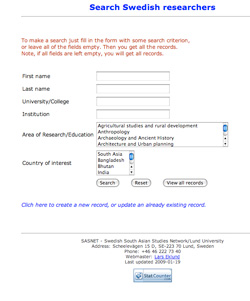 SASNET’s searchable database for Swedish and Nordic researchers involved in any kind of South Asia related research has been updated. The register, created in 2001 has been dormant for a long time but has now been reshuffled, more visibly presented, and with full interactivity for the users. The researchers already represented in the database are obliged to log in and do necessary changes. Log-in information has been sent by e-mail to them. Those Swedish and Nordic researchers not yet represented are kindly invited to join the register and enter information about current South Asia related research in the database. Please go to the entrance page www.sasnet.lu.se/updResearchers.php. As an old user click on the "update" button, as a new user click on the ”new user” button. Please note that your e-mail address will become your user name for future log-in. SASNET’s searchable database for Swedish and Nordic researchers involved in any kind of South Asia related research has been updated. The register, created in 2001 has been dormant for a long time but has now been reshuffled, more visibly presented, and with full interactivity for the users. The researchers already represented in the database are obliged to log in and do necessary changes. Log-in information has been sent by e-mail to them. Those Swedish and Nordic researchers not yet represented are kindly invited to join the register and enter information about current South Asia related research in the database. Please go to the entrance page www.sasnet.lu.se/updResearchers.php. As an old user click on the "update" button, as a new user click on the ”new user” button. Please note that your e-mail address will become your user name for future log-in.
To search for individual researchers in the database, please go to www.sasnet.lu.se/registerf.html.
Please note that the database/register currently is only open for Swedish and Nordic researchers.
In the Swedish magazine Omvärlden, published by the Swedish International Development Cooperation Agency Sida, an impressive article on SASNET appeared in its December 2008 issue (No. 7/2008). The article is written by senior journalist Jöran Hök and is based on an interview with SASNET’s deputy director Lars Eklund at the root node office in Lund. It is titled ”Unikt svenskt nätverk blir förebild för fler forskare” (Unique Swedish network becomes a model for more researchers). Read the article (as a pdf-file, in Swedish only).
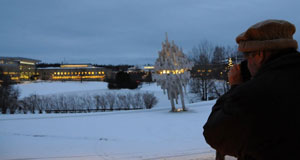 In December 2008, SASNET’s deputy director Lars Eklund made a visit to Umeå University and the Swedish University of Agricultural Sciences in Umeå. Lars met with a large number of researchers, university teachers and administrators interested in South Asia related collaboration projects both in research and education, and the possibilities that SASNET might offer in facilitating such.
He visited departments where South Asia related research and/or education is going on, including the Unit for
Epidemiology and
Public Health Sciences,
the Dept. of Social Work, and Umeå Plant Science Centre (UPSC), run jointly by Umeå University’s Dept. of Forest Genetics and Plant Physiology, and the Swedish University
of Agricultural Sciences (SLU) in Umeå. Read Lars Eklund’s report from Umeå. In December 2008, SASNET’s deputy director Lars Eklund made a visit to Umeå University and the Swedish University of Agricultural Sciences in Umeå. Lars met with a large number of researchers, university teachers and administrators interested in South Asia related collaboration projects both in research and education, and the possibilities that SASNET might offer in facilitating such.
He visited departments where South Asia related research and/or education is going on, including the Unit for
Epidemiology and
Public Health Sciences,
the Dept. of Social Work, and Umeå Plant Science Centre (UPSC), run jointly by Umeå University’s Dept. of Forest Genetics and Plant Physiology, and the Swedish University
of Agricultural Sciences (SLU) in Umeå. Read Lars Eklund’s report from Umeå.
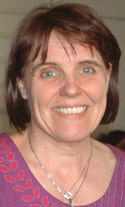 From December 1, 2008, SASNET's Director Anna Lindberg is back in office after a prolonged sick leave. During her absence, Dr. Sidsel Hansson from the Centre for East and South-East Asian Studies (ACE) has substituted her as acting Director of SASNET, but she is now working as co-ordinator for the new Erasmus Mundus External Cooperation Window India programme (EMECW lot 15). From December 1, 2008, SASNET's Director Anna Lindberg is back in office after a prolonged sick leave. During her absence, Dr. Sidsel Hansson from the Centre for East and South-East Asian Studies (ACE) has substituted her as acting Director of SASNET, but she is now working as co-ordinator for the new Erasmus Mundus External Cooperation Window India programme (EMECW lot 15).
 For some time, Anna Lindberg will only work as Director on a 25 % basis. Therefore SASNET has recruited Dr. Stig Toft Madsen from the Nordic Institute of Asian Studies (NIAS) in Copenhagen from December 1 to work as Assistant Director on another 25 % basis. He works from a room next to SASNET’s root node office at Scheelevägen 15 D in Lund. For some time, Anna Lindberg will only work as Director on a 25 % basis. Therefore SASNET has recruited Dr. Stig Toft Madsen from the Nordic Institute of Asian Studies (NIAS) in Copenhagen from December 1 to work as Assistant Director on another 25 % basis. He works from a room next to SASNET’s root node office at Scheelevägen 15 D in Lund.
More information about Dr. Toft Madsen (who defended his doctoral dissertation at the Dept. of Sociology, Lund University in 1995).
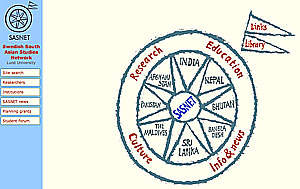 During january 2009, SASNET’s web site has undergone a minor face-lift. The front page has been made more clean, news items have moved to a special page, and the search engine has been easier to find. Direct links have also been introduced in a menu bar to the left for quick access to the Student Forum, the register of individual Swedish researchers, the database of South Asia related Swedish university departments, and the information page about SASNET planning grants. During january 2009, SASNET’s web site has undergone a minor face-lift. The front page has been made more clean, news items have moved to a special page, and the search engine has been easier to find. Direct links have also been introduced in a menu bar to the left for quick access to the Student Forum, the register of individual Swedish researchers, the database of South Asia related Swedish university departments, and the information page about SASNET planning grants.
The work has been carried out by Mr. Paul Hedberg from Lund University’s IT section, and he has continued the work by also upgrading the now dormant individual researchers’ register, making it easier to update information (more information). He will probably also do some changes on the design of other pages in SASNET’s web site (consisting of more than 1,300 pages).
SASNET was represented by its then acting director Dr. Sidsel Hansson at the so-called India Platform UGent meeeting held at Ghent University, Belgium on Saturday 4 October 2008. The meeting was organised by the Research Centre Vergelijkende Cultuurwetenschap (“Comparative Science of Cultures”) at Ghent University and its purpose was to explore potential forms of collaboration among a
network of European universities. The ambition was to form a so-called India Platform UGent with a proposed role to coordinate and facilitate
setting up European collaborative research and educational projects related to India in the
humanities and social sciences. Not much came out of the Ghent meeting, but the discussions will continue at a coming meting at the University of Tartu in Estonia to be held during 2009. See the call for the Ghent meeting.
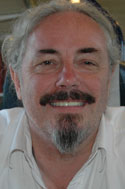 Dr. Christer Norström, Dept. of Social Anthropology, Stockholm University and former SASNET board member, represented SASNET at the first so-called Sida Science Day held in Stockholm on Wednesday 17 December 2008. The event was organised by the Swedish International Development Cooperation Agency (Sida), and is supposed to become an annual event to monitor the
implementation of Sida’s strategy for the advancement of research in
developing countries during the period 2009–13. The Sida Science Day should provide a context
analysis in the area of research policy in low income countries and present
major research findings from research cooperation programmes.
The Sida Science Day 2008 was divided into two parts, the first one only open to Sida staff and other stakeholders
within Sida, and focusing entirely on Africa. The second part, however, was open to a broader audience, and had a wider scope.
Representatives for the
Swedish Ministry of Education, directors of the Swedish Research Councils,
Vice Chancellors and Professors of Swedish universities and university colleges were invited to discuss issues such as ”The Swedish Research Bill
2008”; ”The Swedish policy for
research cooperation with
developing countries”; and ”The Swedish experience of research cooperation”. Full information about the Sida Science Day 2008. Dr. Christer Norström, Dept. of Social Anthropology, Stockholm University and former SASNET board member, represented SASNET at the first so-called Sida Science Day held in Stockholm on Wednesday 17 December 2008. The event was organised by the Swedish International Development Cooperation Agency (Sida), and is supposed to become an annual event to monitor the
implementation of Sida’s strategy for the advancement of research in
developing countries during the period 2009–13. The Sida Science Day should provide a context
analysis in the area of research policy in low income countries and present
major research findings from research cooperation programmes.
The Sida Science Day 2008 was divided into two parts, the first one only open to Sida staff and other stakeholders
within Sida, and focusing entirely on Africa. The second part, however, was open to a broader audience, and had a wider scope.
Representatives for the
Swedish Ministry of Education, directors of the Swedish Research Councils,
Vice Chancellors and Professors of Swedish universities and university colleges were invited to discuss issues such as ”The Swedish Research Bill
2008”; ”The Swedish policy for
research cooperation with
developing countries”; and ”The Swedish experience of research cooperation”. Full information about the Sida Science Day 2008.
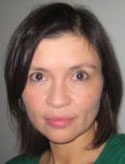 Marie Yoshida, coordinator for the Asian Dynamics Initiative (ADI) at the University of Copenhagen visited SASNET on Thursday 20 November 2008. Ms. Yoshida who is based at the Nordic Institute of Asian Studies (NIAS) in Copenhagen wanted to strenghten links to SASNET. Possible forms of future collaboration were discussed. Lars Eklund also demonstrated SASNET’s website and its wealth of information on South Asia related research at the Swedish universities. Marie Yoshida, coordinator for the Asian Dynamics Initiative (ADI) at the University of Copenhagen visited SASNET on Thursday 20 November 2008. Ms. Yoshida who is based at the Nordic Institute of Asian Studies (NIAS) in Copenhagen wanted to strenghten links to SASNET. Possible forms of future collaboration were discussed. Lars Eklund also demonstrated SASNET’s website and its wealth of information on South Asia related research at the Swedish universities.
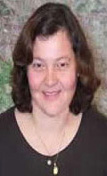 Dr. Seteney Shami, Program Director for Eurasia, Middle East and North Africa at the Social Science Research Council (SSRC) in New York, USA, visited SASNET’s root node office in Lund on Monday 1 December 2008. During the academic year 2008/09, Dr. Shami is a research fellow at the Swedish Collegium for Advanced Study (SCAS) in Uppsala. She came to SASNET to discuss possibilities for setting up an international collaborative network for the study of inter-Asian processes and developments. SSRC plans for a project titled ”Inter-Asian
Connections”. SASNET was represented by its director Anna Lindberg and Dr. Sidsel Hansson. Dr. Leif Stenberg from Lund University’s Centre for Middle Eastern Studies (CME), and Prof. Roger Greatrex from the Centre for East and South-East Asian Studies (ACE) also participated in the meeting. After fruitful discussions, it was suggested that Lund University will host a network planning meeting in the Spring 2009. This would include 10–15 people
representing different institutions across Asia as well as Europe and
America. More information about Seteney Shami. Dr. Seteney Shami, Program Director for Eurasia, Middle East and North Africa at the Social Science Research Council (SSRC) in New York, USA, visited SASNET’s root node office in Lund on Monday 1 December 2008. During the academic year 2008/09, Dr. Shami is a research fellow at the Swedish Collegium for Advanced Study (SCAS) in Uppsala. She came to SASNET to discuss possibilities for setting up an international collaborative network for the study of inter-Asian processes and developments. SSRC plans for a project titled ”Inter-Asian
Connections”. SASNET was represented by its director Anna Lindberg and Dr. Sidsel Hansson. Dr. Leif Stenberg from Lund University’s Centre for Middle Eastern Studies (CME), and Prof. Roger Greatrex from the Centre for East and South-East Asian Studies (ACE) also participated in the meeting. After fruitful discussions, it was suggested that Lund University will host a network planning meeting in the Spring 2009. This would include 10–15 people
representing different institutions across Asia as well as Europe and
America. More information about Seteney Shami.
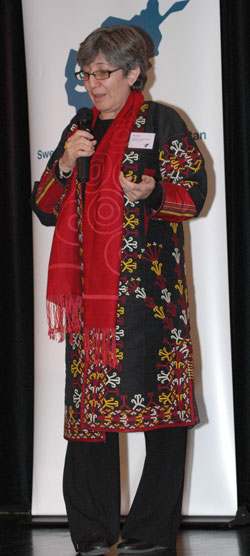 SASNET was represented at the International conference on ”Peacebuilding in Afghanistan: Local, regional and global perspectives” that was held in Stockholm 6–7 November 2008. The conference focused on what the peacebuilding efforts look like in the country? What roles do the Afghan authorities, the International Community, the UN and the Nato-led ISAF forces play? Do they contribute to peace or armed conflict? Are there local initiatives at grassroots level promoting peace and how does the civilian population contribute to the reconstruction of the country? Why does Afghanistan receive so little funding for reconstruction compared to other areas of armed conflict? Have the complex developments in Afghanistan become something that the West would rather not have to deal with? What actions are needed in order for Afghanistan to become a country of peace and stability? SASNET was represented at the International conference on ”Peacebuilding in Afghanistan: Local, regional and global perspectives” that was held in Stockholm 6–7 November 2008. The conference focused on what the peacebuilding efforts look like in the country? What roles do the Afghan authorities, the International Community, the UN and the Nato-led ISAF forces play? Do they contribute to peace or armed conflict? Are there local initiatives at grassroots level promoting peace and how does the civilian population contribute to the reconstruction of the country? Why does Afghanistan receive so little funding for reconstruction compared to other areas of armed conflict? Have the complex developments in Afghanistan become something that the West would rather not have to deal with? What actions are needed in order for Afghanistan to become a country of peace and stability?
The conference was organised by the Swedish Committee for Afghanistan (SCA), in cooperation with ENNA (European Network of NGOs in Afghanistan). Invited speakers included prominent persons such as Sima Samar (photo above), Chairperson of the Afghan Independent Human Rights Commission; Kristian Berg Harpviken,
senior researcher at the International Peace Research Institute (PRIO) in Oslo; and the eminent Pakistani writer/journalist Ahmed Rashid.
Read a report by Lars Eklund.
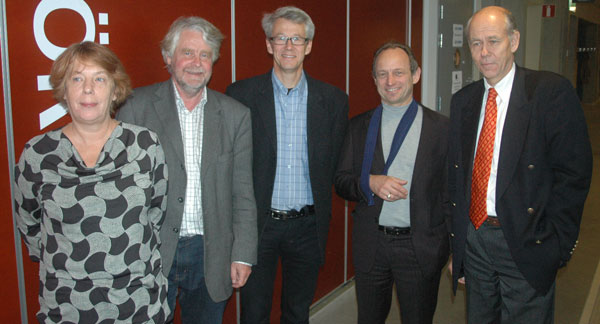 |
SASNET participated in a half-day seminar on Indo-Swedish research and educational collaboration organised by the Faculty of Engineering (LTH), Lund University on Tuesday 21 October 2008. A large number of researchers gathered to listen to presentations by Tomas Aronsson from the Swedish Governmental Agency for Innovation Systems, VINNOVA, who talked about the formalised India-Sweden collaboration within the field of Science & Technology; and Prof. Ramon Wyss, Royal Institute of Technology (KTH), Stockholm, who presented INSTEC, the national network for India-Swedish Cooperation on Technical Research and Education (more information about INSTEC). Lars Eklund then presented SASNET and its role as a national resource base for increased collaboration between researchers and institutions in Sweden and India (and the rest of South Asia). Finally Prof.
Per Warfvinge, Vice-Dean for International Relations at the Faculty of Engineering presented the European Commission funded Erasmus Mundus External Cooperation Window (EMECW) programmes and especially the new India lot being coordinated by Lund University. This programme will enable a mobility flow of 400 fully funded students, researchers and academic staff per year between European and Indian universities. Prof. Warfvinge talked about the great possibilities of the EMECW programme, and the urgency of a quick process to recruit students and researchers. SASNET’s acting Director Dr. Sidsel Hansson will become the coordinator for this EU-India programme (more information).
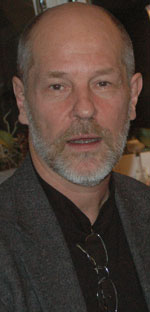 A joint SASNET/UPF (Association of Foreign Affairs at Lund University) seminar on the political development in Nepal was held on Thursday 23 October 2008, 19.30–21.00. David Ludden (photo to the right), Professor of Political Economy and Globalization in the Department of History at New York University, USA was the main speaker with a presentation titled ”Where is the revolution? Towards a Post-National Politics of Social Justice”. Prof. Ludden received his PhD from the University of Pennsylvania in 1978 and was Professor of History there from 1999-2008. His research concentrates on South Asia and on histories of development in very long-term perspective, focusing on economic development, agrarian conditions, health environments, empire, inequality, and social conflict. In August 2008, he was invited by the Social Science Baha to hold the 2008 Mahesh Chandra Regmi Lecture in Kathmandu. A joint SASNET/UPF (Association of Foreign Affairs at Lund University) seminar on the political development in Nepal was held on Thursday 23 October 2008, 19.30–21.00. David Ludden (photo to the right), Professor of Political Economy and Globalization in the Department of History at New York University, USA was the main speaker with a presentation titled ”Where is the revolution? Towards a Post-National Politics of Social Justice”. Prof. Ludden received his PhD from the University of Pennsylvania in 1978 and was Professor of History there from 1999-2008. His research concentrates on South Asia and on histories of development in very long-term perspective, focusing on economic development, agrarian conditions, health environments, empire, inequality, and social conflict. In August 2008, he was invited by the Social Science Baha to hold the 2008 Mahesh Chandra Regmi Lecture in Kathmandu.
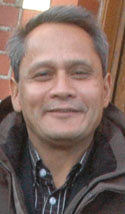 |
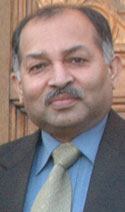 |
Other participants to the Lund seminar were Dr. Katak Malla from the Dept. of Law, Stockholm University, who talked about ”Nepal from monarchy to republic: the ongoing political process”; and HE the Ambassador of Nepal to Denmark (with a side accreditation to Sweden), Mr. Vijaykant Lal Karna, who is also a political scientist by profession, having worked at Tribhuvan University for 20 years.
SASNET’s former Director Prof. Staffan Lindberg, Dept. of Sociology, Lund University was the moderator for the seminar that drew a crowd of around 40 people. Venue for the seminar: Auditorium (Hörsalen) at Lund University’s Centre for Languages and Literature (SOL-Centrum), Helgonabacken 14, Lund. See the full information about the seminar and the three speakers (as a pdf-file).
During their stay in Lund, the Ambassador Mr. Vijaykant Lal Karna and Dr. Katak Malla from Stockholm University, old colleagues fom Tribhuvan University, also visited SASNET’s root node office at Scheelevägen. A fruitful discussion took place regarding the ongoing democratic transition process in Nepal and the urgency of support for the positive development. The Ambassador would welcome such initiatives from Sweden, and he thinks that SASNET should play a facilitating role.
Earlier the same daty, Prof. David Ludden also held a lecture on the concept of Asian area studies, for Master’s students at Lund University. In an illuminating talk, he briefly explained the US national agenda behind the set up and funding of Area Studies departments in US universities. The relevance of area studies (which had a prominent role during the Cold War years) was questioned in the 1990s by advocates of Globalisation as a new way to understand and articulate knowledge about the world; the need for experts on a particular area (or country) seemed outdated in the face of the new globalising world, where borders wouldn’t matter anymore and local differences would eventually be absorbed in the greater global frame. The tragic shock of 9/11, however, brought area studies back to the limelight; US realised it needed a corpus of highly professional experts on areas considered at risk for national security. SASNET’s Maria Tonini attended the lecture, read her report.
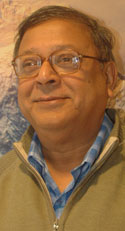 Prof. Rana P.B. Singh gave a SASNET lecture on ”Indian village: tradition, modernity and change” in Lund on Tuesday 28 October 2008. The seminar focusing on the developments in a village in Uttar Pradesh not far from Varanasi, was organised in collaboration with the Dept. of History and Anthropology of Religions, Lund University.
Rana P.B. Singh is a Professor of Cultural Geography at Banaras Hindu University, BHU. He has been involved in studying, performing and promoting the heritage planning, eco-tourism and rural studies and development in the Varanasi region for more than two decades, as consultant, project director, collaborator and organiser. In research, he combines the trilogy of historical process, cultural tradition and environmental ethics to understand the people and landscape in India. His publications include more than 30 volumes, and 150 research papers. He has also a long and strong connection to Sweden, regularly coming here since 1988 mostly being a visiting professor at Karlstad University, but he has also given lectures at the universities of Lund, Göteborg, Uppsala, Stockholm, Copenhagen, Aarhus, Åbo, Vasa, Oslo and Bergen. As president of the Indo-Nordic Cultural Association in Varanasi Prof. Singh has been involved in organising various India Study programmes for both Karlstad University and also Copenhagen University, and been a keen SASNET promoter in India. In 2004 he participated in the 18th ECMSAS conference, organised by SASNET in Lund. He convened Panel No 46 on ”Spirit and Power of Sacred Places, and Preservation of Cultural Heritage”. This year Prof. Singh was invited as a visiting faculty for a month to the Dept. of Religious Studies and Theology at Göteborg University. Read a summary of the SASNET lecture. Prof. Rana P.B. Singh gave a SASNET lecture on ”Indian village: tradition, modernity and change” in Lund on Tuesday 28 October 2008. The seminar focusing on the developments in a village in Uttar Pradesh not far from Varanasi, was organised in collaboration with the Dept. of History and Anthropology of Religions, Lund University.
Rana P.B. Singh is a Professor of Cultural Geography at Banaras Hindu University, BHU. He has been involved in studying, performing and promoting the heritage planning, eco-tourism and rural studies and development in the Varanasi region for more than two decades, as consultant, project director, collaborator and organiser. In research, he combines the trilogy of historical process, cultural tradition and environmental ethics to understand the people and landscape in India. His publications include more than 30 volumes, and 150 research papers. He has also a long and strong connection to Sweden, regularly coming here since 1988 mostly being a visiting professor at Karlstad University, but he has also given lectures at the universities of Lund, Göteborg, Uppsala, Stockholm, Copenhagen, Aarhus, Åbo, Vasa, Oslo and Bergen. As president of the Indo-Nordic Cultural Association in Varanasi Prof. Singh has been involved in organising various India Study programmes for both Karlstad University and also Copenhagen University, and been a keen SASNET promoter in India. In 2004 he participated in the 18th ECMSAS conference, organised by SASNET in Lund. He convened Panel No 46 on ”Spirit and Power of Sacred Places, and Preservation of Cultural Heritage”. This year Prof. Singh was invited as a visiting faculty for a month to the Dept. of Religious Studies and Theology at Göteborg University. Read a summary of the SASNET lecture.
Prof. James Heitzman should have given a SASNET lecture on ”The City in South Asia: Historical Templates and Contemporary Challenges” in Lund on Tuesday 11 November 2008, in collaboration with the Division of Housing Development and Management, Lund Institute of Technology, Lund University. However, due to health problems Prof. Heitzman was forced to cancel his tour to Scandinavia and the seminar in Lund. On 15 November 2008, Prof. Heizman passed away (more information).
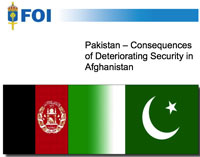 SASNET’s acting director Sidsel Hansson participated in a conference on “Pakistan – Consequences of Deteriorating Security in Afghanistan”, that the Swedish Defence Research Agency, FOI, organised in Stockholm on 9–10 October 2008.
The keynote speakers included Dr. Stephen Cohen (author of Four Crises and a Peace Process 2007), Shuja Nawaz (author of Crossed Swords: Pakistan, its Army and the Wars Within from 2008) and others. Several speakers at the conference drew attention to a recent report by the Pakistan Policy Working Group entitled ”The Next Chapter: The United States and Pakistan”. This report suggests a new Pakistan policy for the incoming administration in the United States.
The October conference was a follow-up on a previous workshop organised by FOI in April 2008, where also SASNET’s deputy director Lars Eklund participated and where other participants were invited from different Swedish universities, research institutes and government departments. The April workshop and the October conference form part of an ongoing FOI research programme on Asian Security. Within this framework, the Swedish Defence Research Agency has initiated a number of sub-projects dealing with Pakistan. One project focuses on militant movements in Afghanistan & Pakistan, a second on
Pakistan’s nuclear weapons: Safety, security and non-state threats; and a third on the Federally Administered Tribal Areas (FATA). In a special project, the FOI researchers have also studied Pakistan’s development after the parliamentary elections held in February 2008. SASNET’s acting director Sidsel Hansson participated in a conference on “Pakistan – Consequences of Deteriorating Security in Afghanistan”, that the Swedish Defence Research Agency, FOI, organised in Stockholm on 9–10 October 2008.
The keynote speakers included Dr. Stephen Cohen (author of Four Crises and a Peace Process 2007), Shuja Nawaz (author of Crossed Swords: Pakistan, its Army and the Wars Within from 2008) and others. Several speakers at the conference drew attention to a recent report by the Pakistan Policy Working Group entitled ”The Next Chapter: The United States and Pakistan”. This report suggests a new Pakistan policy for the incoming administration in the United States.
The October conference was a follow-up on a previous workshop organised by FOI in April 2008, where also SASNET’s deputy director Lars Eklund participated and where other participants were invited from different Swedish universities, research institutes and government departments. The April workshop and the October conference form part of an ongoing FOI research programme on Asian Security. Within this framework, the Swedish Defence Research Agency has initiated a number of sub-projects dealing with Pakistan. One project focuses on militant movements in Afghanistan & Pakistan, a second on
Pakistan’s nuclear weapons: Safety, security and non-state threats; and a third on the Federally Administered Tribal Areas (FATA). In a special project, the FOI researchers have also studied Pakistan’s development after the parliamentary elections held in February 2008.
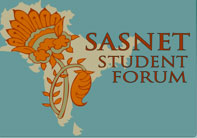 The SASNET Student Forum has been launched. This interactive web forum provides a meeting point for research students interested in South Asia. Both experienced researchers and beginners are welcome to participate in the forum discussions, and the aim is to create a forum including both discussions on academic topics and on practical issues concerning travelling, studying and doing research in India. The forum primarily aims at MA and PhD students in South Asia related disciplines, but others are welcome to join the discussions as well. SASNET student forum is the first step towards creating a sub-network for MA and PhD students interested in South Asian studies. It has been created by PhD Candidate Malin Gregersen, Dept. of History, Lund University. The ambition is to become a vivid meeting ground where students can exchange experiences, discuss research, share information about conferences, seminars and workshops, and become aware of each other’s existence. When the forum has been consolidated it will be expanded to include for example a calendar and a space where one can upload articles and dissertations. Meanwhile space will be provided within the forum for such topics. Go to the SASNET Student Forum. The SASNET Student Forum has been launched. This interactive web forum provides a meeting point for research students interested in South Asia. Both experienced researchers and beginners are welcome to participate in the forum discussions, and the aim is to create a forum including both discussions on academic topics and on practical issues concerning travelling, studying and doing research in India. The forum primarily aims at MA and PhD students in South Asia related disciplines, but others are welcome to join the discussions as well. SASNET student forum is the first step towards creating a sub-network for MA and PhD students interested in South Asian studies. It has been created by PhD Candidate Malin Gregersen, Dept. of History, Lund University. The ambition is to become a vivid meeting ground where students can exchange experiences, discuss research, share information about conferences, seminars and workshops, and become aware of each other’s existence. When the forum has been consolidated it will be expanded to include for example a calendar and a space where one can upload articles and dissertations. Meanwhile space will be provided within the forum for such topics. Go to the SASNET Student Forum.
 52 applications were
received for the 2008 round of SASNET Planning Grants. On Tuesday 26
August 2008 the SASNET Reference group (consisting of three
eminent Nordic South Asia scholars) decided to give networking/planning
grants to eight new research projects. It also decided to give financial support
to seven guest lecture programmes (for inviting a guest lecturer
from South Asia to visit more than one Swedish
university), and four South Asia related interdisciplinary research
workshops (to be held in Sweden or in South Asia). The total
amount distributed was SEK 965 000. 52 applications were
received for the 2008 round of SASNET Planning Grants. On Tuesday 26
August 2008 the SASNET Reference group (consisting of three
eminent Nordic South Asia scholars) decided to give networking/planning
grants to eight new research projects. It also decided to give financial support
to seven guest lecture programmes (for inviting a guest lecturer
from South Asia to visit more than one Swedish
university), and four South Asia related interdisciplinary research
workshops (to be held in Sweden or in South Asia). The total
amount distributed was SEK 965 000.
The following researchers were awarded SASNET planning grants in order to network for new research
projects:
• Anders Björkman, Malaria Research Unit, Dept. of Medicine, Karolinska Institutet Medical University, Stockholm: ”Molecular characterization of clinical isolates of Plasmodium falciparium in Pakistan”. SEK 45 000. More information about the project.
• Artur Chodorowski, Department of Signals and Systems, Chalmers University of Technology, Göteborg: ”Pattern Recognition methods for early detection of precancerous oral lesions in South Asia”. SEK 75 000. More information about the project.
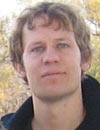 • Mattias Larsen, PADRIGU, School of Global Studies, Göteborg University (photo to the right): ”Development and Demography in North-Western India: Emerging Contexts of Daughter Discrimination”. SEK 75 000. More information about the project. • Mattias Larsen, PADRIGU, School of Global Studies, Göteborg University (photo to the right): ”Development and Demography in North-Western India: Emerging Contexts of Daughter Discrimination”. SEK 75 000. More information about the project.
• Abul Mandal, School of Life Sciences, Skövde University: ”Development of new varieties of crops for avoiding loss of harvest caused by climatic instability in Bangladesh”. SEK 45 000. More information about the project.
• Ebbe Nordlander, Chemical Physics, Centre for Chemistry and Chemical Engineering, Lund University: ”Modelling of hydrodesulfurization reactions and development of new molecular hydrodesulfurization catalysts”. SEK 75 000. More information about the project.
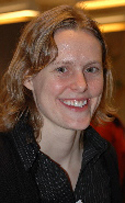 • Camilla Orjuela, PADRIGU, School of Global Studies, Göteborg University (photo to the right): ”Corruption and Conflict: Challenges for Local Governance in Sri Lanka”. SEK 75 000. More information about the project. • Camilla Orjuela, PADRIGU, School of Global Studies, Göteborg University (photo to the right): ”Corruption and Conflict: Challenges for Local Governance in Sri Lanka”. SEK 75 000. More information about the project.
• Leslie Paul and Sadhna Alström, Dept. of Forest Mycology and Pathology, Swedish University of Agricultural Sciences (SLU), Uppsala: ”Development of a collaborative research project between Indian and Swedish researchers towards sustainable hillberry production for small farm holders in Himalayan states of India”. SEK 75 000. More information about the project.
• Joyanto Routh, Dept. of Geology and Geochemistry, Stockholm University: ”Biogeochemical signatures and high-resolution paleoclimatic records in spelotherms from caves in Meghalaya (India)”. SEK 60 000. More information about the project.
The following researchers were awarded SASNET planning grants in order to organise an interdisciplinary workshop:
• Alia Ahmad, Dept. of Economics, Lund University: Workshop about Designing action research on the development of inland fisheries for poverty alleviation in Bangladesh. SEK 75 000.
More information about the workshop.
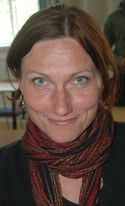 • Anna Laine, Social Anthropology, School of Global Studies, Göteborg University (photo to the right): ”Workshop on The Kolam Practice – in Dialogue with Anthropology and Art Practice”. SEK 75 000. More information about the workshop. • Anna Laine, Social Anthropology, School of Global Studies, Göteborg University (photo to the right): ”Workshop on The Kolam Practice – in Dialogue with Anthropology and Art Practice”. SEK 75 000. More information about the workshop.
• Maria Lantz, Art & Architecture, Royal University College of Fine Arts (KKH): Workshop on DHARAVI: Documenting Informalities. SEK 75 000.
More information about the workshop.
• Mikael Schultz, PADRIGU, School of Global Studies, Göteborg University: Workshop: Sri Lanka Conference on Peace and Development Research. SEK 75 000. More information about the conference.
The following researchers were awarded SASNET Guest Lecture Programme grants:
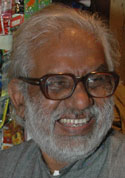 • Daniel Andersson and Åke Sander, Dept. of Religious Studies, theology and classical philology, Göteborg University: Invitation of Dr. Dipak Malik, Gandhian Institute of Studies, Jamui Campus, Bihar, India (photo to the right). Co-invited by: Religious Studies, Högskolan Dalarna; and Dept. of Sociology, Lund University. SEK 20 000 . • Daniel Andersson and Åke Sander, Dept. of Religious Studies, theology and classical philology, Göteborg University: Invitation of Dr. Dipak Malik, Gandhian Institute of Studies, Jamui Campus, Bihar, India (photo to the right). Co-invited by: Religious Studies, Högskolan Dalarna; and Dept. of Sociology, Lund University. SEK 20 000 .
• Neelambar Hatti, Dept. of Economic History, Lund University: Invitation of Dr. T V Sekher, Associate Professor, Department of Population Policies and Programs, International Institute for Population Sciences, Mumbai, India. Co-invited by: Nordic Centre in India (NCI) to deliver lectures at Umeå University, Stockholm University and Göteborg University. SEK 20 000.
• Jan Johansson, Social Anthropology, School of Global Studies, Göteborg University: Invitation of Dr. Mahbub Alam, Assistant Professor, School of Liberal Arts and Science, Independent University of Bangladesh (IUB). Co-invited by: Uppsala Centre for Sustainable Development (CSD). SEK 20 000.
• Diane Pecorari, School for Education, Culture and Communication, Mälardalens högskola: Invitation of Dr. Ashis Sengupta, University of North Bengal, India. Co-invited by: Dept. of Humanities, Växjö University; and School of Arts and Languages, Högskolan Dalarna . SEK 20 000.
• Joyanto Routh, Dept. of Geology and Geochemistry, Stockholm University: Invitation of Dr. S P Sinha Ray, Centre for Groundwater Studies, Kolkata, India. Co-invited by: Geological Survey of Sweden (SGU), Stockholm; Uppsala University (Hydrology Section); and Division of Land and Water Resources Engineering, Royal Institute of Technology (KTH), Stockholm. SEK 20 000.
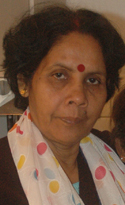 • Ferdinando Sardella, Dept. of Religious Studies, theology and classical philology, Göteborg University: Invitation of Dr. Ruby Sain, Dept. of Sociology, Jadavpur University, Kolkata, India (photo to the right). Co-invited by Vårdal Institute, Lund University. SEK 20 000 . • Ferdinando Sardella, Dept. of Religious Studies, theology and classical philology, Göteborg University: Invitation of Dr. Ruby Sain, Dept. of Sociology, Jadavpur University, Kolkata, India (photo to the right). Co-invited by Vårdal Institute, Lund University. SEK 20 000 .
• Ashok Swain, Dept. of Peace and Conflict Research, Uppsala University: Invitation of K V Raju, Professor and Head, Centre for Ecological Economics and Natural Resources, Institute for Social and Economic Change, Bangalore, India. Co-invited by: Dept. of Archaeology, Conservation and History, University of Oslo. SEK 20 000.
Since SASNET was established in 2001, a total number of 109 planning grants have been distributed to Swedish researchers working on South Asia related projects within all fields – from technology and natural sciences to humanities, social sciences and educational sciences. The researchers who have benefited from the grants belong to 20 different Swedish universities and university colleges. Out of the 109 grants awarded so far, 67 refer to networking grants to plan for new research projects/programmes; 20 to grants in order to develop new educational projects/programmes; 8 to organise interdisciplinary workshops; and 14 to the guest lecture programme.
In the evaluation of SASNET that was carried out in 2005 (go for the evaluation report), it was shown that 70 p.c. of the projects that had been given SASNET planning grants till 2004 had later been given substantial funding from other sources, such as Sida/SAREC, Swedish Research Council, Bank of Sweden Tercentennary Fund, and the European Commission. No similar evaluation has been carried out since, but it is our firm conviction that SASNET’s planning grants continue to play an important role setting new South Asia related projects/programmes in motion. Go for the complete list of SASNET planning grants distributed 2001–2008.
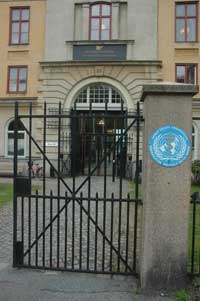 On 25–26 September 2008, SASNET’s deputy director Lars Eklund visited Göteborg to visit the 2008 Göteborg Book Fair, an important event with several South Asian features. Seminars were held with Mahasweta Devi, Ambai and other invited Indian writers, that have got their works translated into Swedish through the ongoing Indo-Swedish translation project. Read Lars Eklund’s report from the book fair.
While in Göteborg, Mr. Eklund also made a visit to the Nordic School of Public Health (NHV), an eminent institution of higher education funded by the the Nordic Council of Ministers. Lars met with the Vice-Chancellor Professor Göran
Bondjers and discussed new South Asia related research projects at NHV. On 25–26 September 2008, SASNET’s deputy director Lars Eklund visited Göteborg to visit the 2008 Göteborg Book Fair, an important event with several South Asian features. Seminars were held with Mahasweta Devi, Ambai and other invited Indian writers, that have got their works translated into Swedish through the ongoing Indo-Swedish translation project. Read Lars Eklund’s report from the book fair.
While in Göteborg, Mr. Eklund also made a visit to the Nordic School of Public Health (NHV), an eminent institution of higher education funded by the the Nordic Council of Ministers. Lars met with the Vice-Chancellor Professor Göran
Bondjers and discussed new South Asia related research projects at NHV.
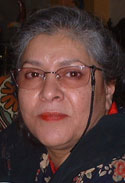 Dr. Durre S. Ahmed, Head of Communication & Cultural Studies, National College of Arts, Lahore, Pakistan, gave a seminar in Lund, titled ”Human Rights and Women’s Activism in Contemporary Pakistan” on Tuesday 7 October 2008. Chapters from the book ”Gendering the Spirit: Women and Religion and the Post-Colonial Response” [2002], edited by prof Durre Ahmed, and an
Article by Kishore Mahbubani, were recommended reading before the seminar. The seminar was jointly organised by SASNET, the Centre for Middle Eastern Studies (CME), and Lund University’s Human Rights programme (based at the Centre for Theology and Religious Studies). Dr. Ahmed has a doctorate in Communications from Columbia University in New York, but is also a practicing psychotherapist. From her South Asian vantage point she delivers a civilisatory critique of modernisms and the Cartesian derived ethos of ‘The West’. Being also a protagonist of dialogue between adherents of the different world religions, Dr Ahmed currently includes in her analysis also different forms of Islam, criticizing “hegemonic notions of masculinity” found within Islam. Venue: Room 218, Centre for Theology and Religious Studies, Allhelgona Kyrkogata 8, Lund. More information. Dr. Durre S. Ahmed, Head of Communication & Cultural Studies, National College of Arts, Lahore, Pakistan, gave a seminar in Lund, titled ”Human Rights and Women’s Activism in Contemporary Pakistan” on Tuesday 7 October 2008. Chapters from the book ”Gendering the Spirit: Women and Religion and the Post-Colonial Response” [2002], edited by prof Durre Ahmed, and an
Article by Kishore Mahbubani, were recommended reading before the seminar. The seminar was jointly organised by SASNET, the Centre for Middle Eastern Studies (CME), and Lund University’s Human Rights programme (based at the Centre for Theology and Religious Studies). Dr. Ahmed has a doctorate in Communications from Columbia University in New York, but is also a practicing psychotherapist. From her South Asian vantage point she delivers a civilisatory critique of modernisms and the Cartesian derived ethos of ‘The West’. Being also a protagonist of dialogue between adherents of the different world religions, Dr Ahmed currently includes in her analysis also different forms of Islam, criticizing “hegemonic notions of masculinity” found within Islam. Venue: Room 218, Centre for Theology and Religious Studies, Allhelgona Kyrkogata 8, Lund. More information.
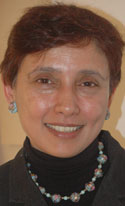 Prof. Radhika Desai, Dept of Political Studies, University of Manitoba, Winnipeg, Canada, held a SASNET lecture on ”The Dynamics of Caste, Class and Hindu Nationalism in India” in Lund on Friday 19 September 2008. The seminar was organised in collaboration with the Dept. of Political Science, Lund University. Prof. Desai discussed the fact that the politics of Hindutva and those of caste are generally assumed to be opposed in India. In her paper, she contests this view on the basis of an original account of caste and its modern dynamics and their interaction with class, especially in the context of liberalizing economic policy since the late 1960s. On the basis of these, the paper goes on to provide a novel interpretation of the political evolution of India in recent decades. In this account, the rise of Hindutva is the result of the rise of the middle castes and their political assertion. The different form it takes in different states, and the variety of different relationships between this middle caste political assertion and Hindutva, are also outlined. The main reason for Radhika Desai coming to Sweden was to participate in the 2008 European Social Forum, held in Malmö 17-21 September. Venue for the Lund lecture: Main conference room, Dept. of Political Science, Paradisgatan 5, Lund. More information. Prof. Radhika Desai, Dept of Political Studies, University of Manitoba, Winnipeg, Canada, held a SASNET lecture on ”The Dynamics of Caste, Class and Hindu Nationalism in India” in Lund on Friday 19 September 2008. The seminar was organised in collaboration with the Dept. of Political Science, Lund University. Prof. Desai discussed the fact that the politics of Hindutva and those of caste are generally assumed to be opposed in India. In her paper, she contests this view on the basis of an original account of caste and its modern dynamics and their interaction with class, especially in the context of liberalizing economic policy since the late 1960s. On the basis of these, the paper goes on to provide a novel interpretation of the political evolution of India in recent decades. In this account, the rise of Hindutva is the result of the rise of the middle castes and their political assertion. The different form it takes in different states, and the variety of different relationships between this middle caste political assertion and Hindutva, are also outlined. The main reason for Radhika Desai coming to Sweden was to participate in the 2008 European Social Forum, held in Malmö 17-21 September. Venue for the Lund lecture: Main conference room, Dept. of Political Science, Paradisgatan 5, Lund. More information.
A seminar/panel discussion on Afghanistan was held in Lund on Wednesday 24 September 2008. The seminar was titled ”Upptrappning Afghanistan. Vilken roll spelar de svenska soldaterna?” (Escalation in Afghanistan. Which role do the Swedish soldiers play?), and was jointly organised by SASNET, the Association of Foreign Affairs at Lund University (UPF), the Swedish Committe for Afghanistan (SCA) in Lund, and the Centre for Middle Eastern Studies (MES). The participants were Mr. Bengt Kristiansson, former general secretary for SCA Sweden; and
Mr. Allan Widman, MP representing Folkpartiet, specialised on defence policy issues. Dr. Catarina Kinnvall, Dept. of Political Science, Lund University, was the moderator for the discussion. Dr. Stig Toft Madsen, senior researcher at the Nordic Institute of Asian Studies (NIAS) in Copenhagen was also supposed to participate, but he fell ill and could not come. Venue: Auditorium (Hörsalen) at Lund University’s Centre for Languages and Literature (SOL-Centrum), Helgonabacken 14, Lund. More information.
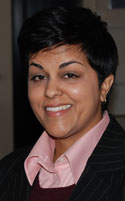 Parul Sharma, CSR Advisor,
Group Assurance,
Sandvik AB, held a SASNET lecture at Lund University on Wednesday 10 September 2008, 13.15–15.00. The lecture was titled ”A Globalised South Asia and Human Rights”, and drew an audience of more than 40 people (mostly students from the Masters programme in Asian studies at Lund University’s Centre for East and South-East Asian Studies (ACE), and Raoul Wallenberg Institute for Humanitarian Rights (RWI). Ms. Sharma is to some extent connected to the Dept. of Law, Stockholm University, and the National Law School of India University in Bangalore, India, but has also worked for the Amnesty Business Group. Since August 2008, she works for the Swedish company Sandvik AB. Her lecture focused about the current increased interest in how the role of business operations in society has been promoted by heightened business debates about human rights conditions in the South Asian region. The lecture was held in the Java Hall at Scheelevägen 15 C (next to the Asia Library). More information about the seminar. Parul Sharma, CSR Advisor,
Group Assurance,
Sandvik AB, held a SASNET lecture at Lund University on Wednesday 10 September 2008, 13.15–15.00. The lecture was titled ”A Globalised South Asia and Human Rights”, and drew an audience of more than 40 people (mostly students from the Masters programme in Asian studies at Lund University’s Centre for East and South-East Asian Studies (ACE), and Raoul Wallenberg Institute for Humanitarian Rights (RWI). Ms. Sharma is to some extent connected to the Dept. of Law, Stockholm University, and the National Law School of India University in Bangalore, India, but has also worked for the Amnesty Business Group. Since August 2008, she works for the Swedish company Sandvik AB. Her lecture focused about the current increased interest in how the role of business operations in society has been promoted by heightened business debates about human rights conditions in the South Asian region. The lecture was held in the Java Hall at Scheelevägen 15 C (next to the Asia Library). More information about the seminar.
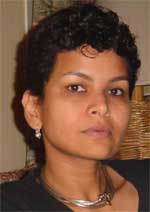 |
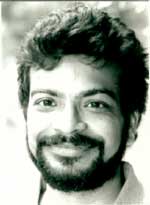 |
SASNET was the main funder for the international research conference on “Nature, Knowledge, Power” that was held in Uppsala 15-17 August 2008. The conference, hosted by the Department of Urban and Rural Development at the Swedish University of Agricultural Sciences (SLU), brought together researchers from different academic fields, concerned with questions of environment and society under present and historical conditions. About forty researchers and research students equally from South Asian and European universities participated in the conference and 25 full research papers were presented papers within five panels: “Energy: renewable and sustainable?”, “Competing rights, codifying law”, “Community rights under neoliberal rule”, “Who needs conservation? Nature, people, survival”, and “Ideologies of environmental change: from imperial modernization to postcolonial social equality?” The keynote speakers were Dr. Amita Baviskar from the Institute of Economic Growth at Delhi University, India and Prof. Arun Agrawal, University of Michigan.
At the conference, an inter-disciplinary network of researchers focusing on South Asian environmental issues began to emerge. SASNET will work to find ways to let this network materialize within its own activities. More information about the Uppsala conference.
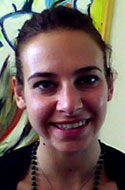 During the Fall 2008, Maria Tonini worked on a voluntary basis as an assistant for SASNET. Ms. Tonini is an Italian citizen who has moved to Sweden. She completed a Masters degree in Critical Media and Cultural Studies from the the School of Oriental and African Studies (SOAS), University of London in 2006, and then worked as a Researcher and Online Editor for the Ethnic Multicultural Media Academy in London. Recently she has also worked as Fundraising Assistant for the Indian National Trust For Art and Cultural Heritage (INTACH) in Pondicherry, India. At SASNET, Maria Tonini was engaged in the work to update our web pages with information about Swedish university departments with South Asia related research and education. During the Fall 2008, Maria Tonini worked on a voluntary basis as an assistant for SASNET. Ms. Tonini is an Italian citizen who has moved to Sweden. She completed a Masters degree in Critical Media and Cultural Studies from the the School of Oriental and African Studies (SOAS), University of London in 2006, and then worked as a Researcher and Online Editor for the Ethnic Multicultural Media Academy in London. Recently she has also worked as Fundraising Assistant for the Indian National Trust For Art and Cultural Heritage (INTACH) in Pondicherry, India. At SASNET, Maria Tonini was engaged in the work to update our web pages with information about Swedish university departments with South Asia related research and education.
Later, Ms. Tonini was for some time employed by Lund University to assist with the new Erasmus Mundus External Cooperation Window India programme (EMECW 15, administered by Lund University).
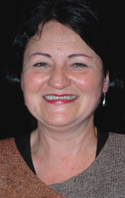 SASNET was very much involved when Baul Shilpi, a group of baul singers from Bangladesh, visited Lund in the end of August 2008. The group that made a great success during their Sweden tour in 2003, now again visited Sweden invited by Dr. Christina Nygren (photo) from the Dept. of Musicology and Theatre Studies,
Stockholm University. The group consisted of four professional baul singers – Kajal Dewan,
Akkas Dewan,
Aklima Begam and Nasima Dewan – and two other musicians (playing drums and flute), plus the tour leader Sirajul Islam, coming from villages near to Dhaka. On Tuesday 26 August, SASNET organised a seminar on baul music and other forms of Bengali folk culture with Dr. Nygren. The seminar was also held at Sagohuset (where a well-attended concert was held the same evening). More information. SASNET was very much involved when Baul Shilpi, a group of baul singers from Bangladesh, visited Lund in the end of August 2008. The group that made a great success during their Sweden tour in 2003, now again visited Sweden invited by Dr. Christina Nygren (photo) from the Dept. of Musicology and Theatre Studies,
Stockholm University. The group consisted of four professional baul singers – Kajal Dewan,
Akkas Dewan,
Aklima Begam and Nasima Dewan – and two other musicians (playing drums and flute), plus the tour leader Sirajul Islam, coming from villages near to Dhaka. On Tuesday 26 August, SASNET organised a seminar on baul music and other forms of Bengali folk culture with Dr. Nygren. The seminar was also held at Sagohuset (where a well-attended concert was held the same evening). More information.
On Monday 11 August 2008, SASNET’s acting Director Sidsel Hansson and Deputy Director Lars Eklund participated in the celebration of the Indian independence day in Stockholm. The festivities were organised at Scandic Sergel Plaza Hotel in central Stockholm. During this occasion, a chance was given to say farewell to the outgoing Indian Ambassador to Sweden, Ms. Deepa Gopalan Wadhwa, and meet a large number of India related academics, cultural personalities and diplomats.
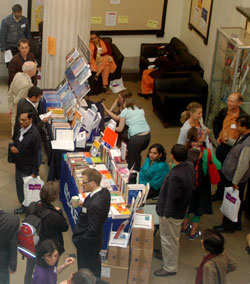 SASNET’s Deputy Director Lars Eklund participated in the 20th European Conference on Modern South Asian Studies (ECMSAS)
that was held in Manchester, UK, 8–11 July 2008.
The 2008 conference
was hosted by the School of Arts, Histories and Cultures at
the University of Manchester. 40 panels were included in the programme, covering a vast field of scientific areas, from ”Censorship, Subjectivity, and Subversion: Cultural Regulation in India from the
Colonial Era to the Present” to ”Vegetarianisms: the communicative power of meat in South Asia” and ”Routes and Roots of Democracy in the Himalayas”. Professor Sanjay Subrahmanyam (photo to the right), Professor of Indian History at the University of
California at Los Angeles (UCLA), held the keynote lecture on ”Cultures of Travel between Anjou and Agra in the Early Modern World”. The conference also offered a range of cultural events including an illustrated lecture on the textiles trade between Manchester and South Asia held at the Whitworth Art Gallery, and a reception at Manchester's spectacular town hall, built during the 1880s. More information about the conference. SASNET’s Deputy Director Lars Eklund participated in the 20th European Conference on Modern South Asian Studies (ECMSAS)
that was held in Manchester, UK, 8–11 July 2008.
The 2008 conference
was hosted by the School of Arts, Histories and Cultures at
the University of Manchester. 40 panels were included in the programme, covering a vast field of scientific areas, from ”Censorship, Subjectivity, and Subversion: Cultural Regulation in India from the
Colonial Era to the Present” to ”Vegetarianisms: the communicative power of meat in South Asia” and ”Routes and Roots of Democracy in the Himalayas”. Professor Sanjay Subrahmanyam (photo to the right), Professor of Indian History at the University of
California at Los Angeles (UCLA), held the keynote lecture on ”Cultures of Travel between Anjou and Agra in the Early Modern World”. The conference also offered a range of cultural events including an illustrated lecture on the textiles trade between Manchester and South Asia held at the Whitworth Art Gallery, and a reception at Manchester's spectacular town hall, built during the 1880s. More information about the conference.
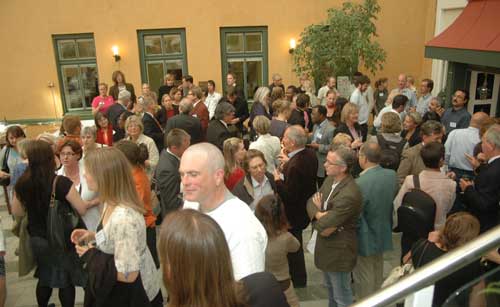 SASNET’s Deputy Director Lars Eklund participated in the Report from Uppsala conference in the conference on current Swedish development research that was held in Uppsala on 27–29 May 2008. It was the fourth in a row of conferences initiated and financed by Sida/SAREC – the unit for research cooperation within the the Swedish International Development Cooperation Agency Sida.
The 2008 conference was organised by the Centre for Sustainable Development in Uppsala, an inter-disciplinary centre for education and research on sustainable development, jointly run by Uppsala University and the Swedish University of Agricultural Sciences (SLU) in Uppsala.
The general theme for the three-day conference was “Meeting Global Challenges in Research Cooperation”. Researchers and development professionals were invited to gather and discuss key themes at the frontiers of research and global development issues. Read Lars Eklund’s report on South Asia related research presented at the Uppsala conference. SASNET’s Deputy Director Lars Eklund participated in the Report from Uppsala conference in the conference on current Swedish development research that was held in Uppsala on 27–29 May 2008. It was the fourth in a row of conferences initiated and financed by Sida/SAREC – the unit for research cooperation within the the Swedish International Development Cooperation Agency Sida.
The 2008 conference was organised by the Centre for Sustainable Development in Uppsala, an inter-disciplinary centre for education and research on sustainable development, jointly run by Uppsala University and the Swedish University of Agricultural Sciences (SLU) in Uppsala.
The general theme for the three-day conference was “Meeting Global Challenges in Research Cooperation”. Researchers and development professionals were invited to gather and discuss key themes at the frontiers of research and global development issues. Read Lars Eklund’s report on South Asia related research presented at the Uppsala conference.
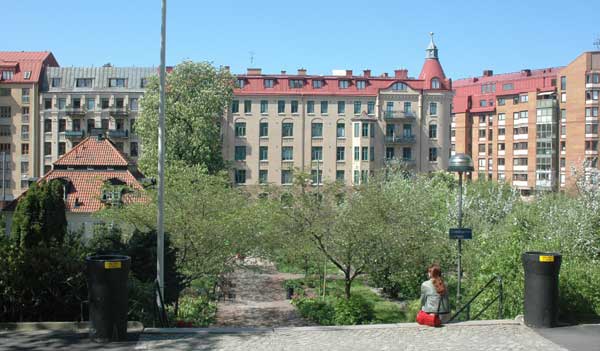 On Tuesday 13 May 2008, Lars Eklund and Sidsel Hansson from SASNET again visited Göteborg University. In the morning they visited different medical departments at Sahlgrenska Academy involved in research collaboration with Pakistan, Bangladesh and Nepal. In the afternoon a meeting was organised at the School of Global Studies for several researchers working on South Asia related projects at different divisions within the School of Global Studies, as well as a few researchers coming from other departments in the Faculty of Humanities at Göteborg University. Full information about the SASNET visit to Göteborg on May 13, 2008. On Tuesday 13 May 2008, Lars Eklund and Sidsel Hansson from SASNET again visited Göteborg University. In the morning they visited different medical departments at Sahlgrenska Academy involved in research collaboration with Pakistan, Bangladesh and Nepal. In the afternoon a meeting was organised at the School of Global Studies for several researchers working on South Asia related projects at different divisions within the School of Global Studies, as well as a few researchers coming from other departments in the Faculty of Humanities at Göteborg University. Full information about the SASNET visit to Göteborg on May 13, 2008.
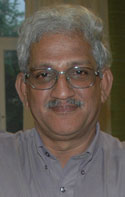 Professor Venkatesh B. Athreya, MS Swaminathan Foundation, Chennai, India, held a well-attended SASNET/UPF lecture at Lund University on Monday 12 May 2008, 19.00–21.00. The lecture, jointly organised by SASNET and the Association of Foreign Affairs at Lund University (UPF), was titled ”Wealth and Poverty in
Rapidly Globalising India”. Currently, Prof. Athreya is co-operating with the Swedish sociologists Göran Djurfeldt and Staffan Lindberg, Dept. of Sociology, Lund University; and the two Indian researchers Dr. R. Vidyasagar from the Madras Institute of Development Studies in Chennai, India, and Dr. A. Rajagopal from SaciWATERs in Hyderabad, in a restudy of 300 agricultural households in Tiruchirapalli District, Tamil Nadu, people who were originally interviewed in 1979/80. The reason for coming to Lund was actually to participate in a concluding workshop regarding this project. More information, with fact sheets from the lecture. Professor Venkatesh B. Athreya, MS Swaminathan Foundation, Chennai, India, held a well-attended SASNET/UPF lecture at Lund University on Monday 12 May 2008, 19.00–21.00. The lecture, jointly organised by SASNET and the Association of Foreign Affairs at Lund University (UPF), was titled ”Wealth and Poverty in
Rapidly Globalising India”. Currently, Prof. Athreya is co-operating with the Swedish sociologists Göran Djurfeldt and Staffan Lindberg, Dept. of Sociology, Lund University; and the two Indian researchers Dr. R. Vidyasagar from the Madras Institute of Development Studies in Chennai, India, and Dr. A. Rajagopal from SaciWATERs in Hyderabad, in a restudy of 300 agricultural households in Tiruchirapalli District, Tamil Nadu, people who were originally interviewed in 1979/80. The reason for coming to Lund was actually to participate in a concluding workshop regarding this project. More information, with fact sheets from the lecture.
 SASNET’s acting director, Dr. Sidsel Hansson, and its deputy director, Lars Eklund, participated in the Globe Forum Conference 2008, held in Stockholm 7–8 May 2008. Globe Forum is an annual international conference held in Stockholm for business leaders, entrepreneurs, academics, political leaders and state actors working in the most dynamic growing markets. The theme for the 2008 conference was: ”Business Innovation for Sustainable Growth”. The primary focus of the conference is to share views and information from the fastest growing markets: China, India, Central and Eastern Europe and the Gulf region, and inspire new business opportunities in the light of global environmental and social challenges. The conference addresses the technology and consumer perspectives and the broader energy areas, including energy availability and usage, transport and environmental issues. SASNET’s acting director, Dr. Sidsel Hansson, and its deputy director, Lars Eklund, participated in the Globe Forum Conference 2008, held in Stockholm 7–8 May 2008. Globe Forum is an annual international conference held in Stockholm for business leaders, entrepreneurs, academics, political leaders and state actors working in the most dynamic growing markets. The theme for the 2008 conference was: ”Business Innovation for Sustainable Growth”. The primary focus of the conference is to share views and information from the fastest growing markets: China, India, Central and Eastern Europe and the Gulf region, and inspire new business opportunities in the light of global environmental and social challenges. The conference addresses the technology and consumer perspectives and the broader energy areas, including energy availability and usage, transport and environmental issues.
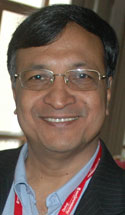 The
Swedish International Development Cooperation Agency (Sida) was one of Globe Forum's partners this year. Sida's new Director-General Anders Nordström was one of the keynote speakers. Other invited speakers for the 2008 Globe Forum included Dipal Chandra Barua (photo to the right),
Deputy Managing Director for
Grameen Shakti (the
Nobel Prize Laureate microcredit institution); K.P. Nyati,
Principal Adviser, Confederation of Indian Industry (CII); and Bharti Patel from the
Society for Voluntary Action Revitalisation and Justice (SVARAJ) in Bangalore. Mr. Barua and Ms. Patel participated in a seminar on ”The rise of microfinance: How village women challenge Wall Street men”. Read a SASNET report from Globe Forum 2008. The
Swedish International Development Cooperation Agency (Sida) was one of Globe Forum's partners this year. Sida's new Director-General Anders Nordström was one of the keynote speakers. Other invited speakers for the 2008 Globe Forum included Dipal Chandra Barua (photo to the right),
Deputy Managing Director for
Grameen Shakti (the
Nobel Prize Laureate microcredit institution); K.P. Nyati,
Principal Adviser, Confederation of Indian Industry (CII); and Bharti Patel from the
Society for Voluntary Action Revitalisation and Justice (SVARAJ) in Bangalore. Mr. Barua and Ms. Patel participated in a seminar on ”The rise of microfinance: How village women challenge Wall Street men”. Read a SASNET report from Globe Forum 2008.
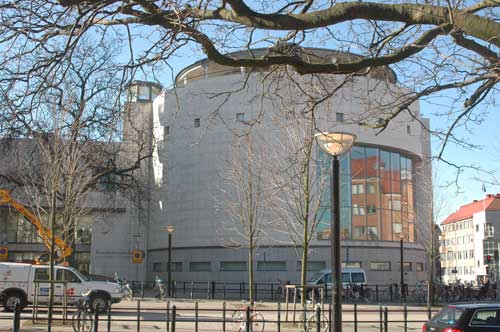 On Friday 18 April 2008, Lars Eklund and Sidsel Hansson from SASNET visited Göteborg University and Chalmers University of Technology. In the morning they participated in a seminar titled ”Indien – ett framtidsland?” (India – land of the future?), organised by the Board of Regional Research in West Sweden (Reväst), at the Dept. of Human and Economic Geography, School of Business, Economics
and Law (photo) at Göteborg University. In the afternoon, an informal meeting with researchers interested in South Asia related projects on technology was organised at Chalmers University of Technology for Lars and Sidsel. The meeting was convened by Dr. Catharina Hiort at Chalmers Biocenter, that co-ordinates bioengineering activities at Chalmers with an aim to strengthen research related to biology, biotechnology, and medicine. Full information about the SASNET visit to Göteborg. On Friday 18 April 2008, Lars Eklund and Sidsel Hansson from SASNET visited Göteborg University and Chalmers University of Technology. In the morning they participated in a seminar titled ”Indien – ett framtidsland?” (India – land of the future?), organised by the Board of Regional Research in West Sweden (Reväst), at the Dept. of Human and Economic Geography, School of Business, Economics
and Law (photo) at Göteborg University. In the afternoon, an informal meeting with researchers interested in South Asia related projects on technology was organised at Chalmers University of Technology for Lars and Sidsel. The meeting was convened by Dr. Catharina Hiort at Chalmers Biocenter, that co-ordinates bioengineering activities at Chalmers with an aim to strengthen research related to biology, biotechnology, and medicine. Full information about the SASNET visit to Göteborg.
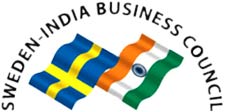 On Thursday 10 April 2008, 12.00–17.00, SASNET and SIBC (Sweden-India Business Council) organised a business seminar in Lund in collaboration with the Ideon Science Park. The seminar was titled ”Operating in India” (Verksam i Indien), and included presentations focusing on challenges that Swedish companies face when they establish businesses in India. SASNET’s former Director, Prof. Staffan Lindberg, was the moderator, and deputy Director Lars Eklund made an introduction to the seminar (See the full programme). The issue of Corporate Social
Responsibility (CSR) was a key concept, and representatives of IKEA, Indiska magasinet, Lufthansa, and the Swedish Export Council discussed their experiences of CSR. Read a report from the business seminar. On Thursday 10 April 2008, 12.00–17.00, SASNET and SIBC (Sweden-India Business Council) organised a business seminar in Lund in collaboration with the Ideon Science Park. The seminar was titled ”Operating in India” (Verksam i Indien), and included presentations focusing on challenges that Swedish companies face when they establish businesses in India. SASNET’s former Director, Prof. Staffan Lindberg, was the moderator, and deputy Director Lars Eklund made an introduction to the seminar (See the full programme). The issue of Corporate Social
Responsibility (CSR) was a key concept, and representatives of IKEA, Indiska magasinet, Lufthansa, and the Swedish Export Council discussed their experiences of CSR. Read a report from the business seminar.
 On March 13, 2008, SASNET’s Director Anna Lindberg participated in a meeting at the Department for Asia and the Pacific region, Swedish Ministry of Foreign Affairs (UD) in Stockholm. The aim of the meeting was to discuss the new country strategy for development cooperation with India that has been announced by the Swedish Government. The task of implementing the new strategy has been given to the Swedish International Development Cooperation Agency (SIDA). “Traditional development cooperation” has been phased out and replaced by selective and actor-based development cooperation. The point of departure in the new strategy is that the financing of various projects will gradually shift to the partners involved. More information about the Swedish policy for Global Development. On March 13, 2008, SASNET’s Director Anna Lindberg participated in a meeting at the Department for Asia and the Pacific region, Swedish Ministry of Foreign Affairs (UD) in Stockholm. The aim of the meeting was to discuss the new country strategy for development cooperation with India that has been announced by the Swedish Government. The task of implementing the new strategy has been given to the Swedish International Development Cooperation Agency (SIDA). “Traditional development cooperation” has been phased out and replaced by selective and actor-based development cooperation. The point of departure in the new strategy is that the financing of various projects will gradually shift to the partners involved. More information about the Swedish policy for Global Development.
Klas Molin (head of the Department for Asia and the Pacific Region) led the meeting, which was attended by approximately one hundred people. Most of them represented Swedish universities, the business world, SIDA, UD, or various organisations. The organisers expressed their satisfaction and surprise that so many individuals came to the meeting – an indicator of the importance India is playing in the global arena today. The participants had the opportunity to contribute their input on the new development strategy. SIDA is now working on the details of the projected strategy and will deliver a final proposal to the Swedish Government in October 2008.
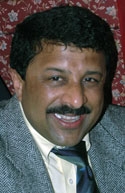 • Dr. Anirudh Krishna, Associate Professor of Public Policy and Political Science at the Sanford Institute of Public Policy, Duke University, Durham, N.C., USA held a lecture in Lund on Tuesday 1 April 2008. The lecture, jointly organised by SASNET and the Association of Foreign Affairs at Lund University (UPF), was titled ”Active Social Capital: Tracing the Roots of Development and Democracy in India”, which is also the title of Dr. Krishna’s recently published book. During the academic year 2007/08, Dr. Krishna is on sabbatical leave from Duke University, instead being Olof Palme Visiting Professor at Uppsala University (more information about Dr. Krishna). Venue: Edens hörsal, Dept. of Political Science, Paradisgatan 5, Lund. More information (as a pdf-file) • Dr. Anirudh Krishna, Associate Professor of Public Policy and Political Science at the Sanford Institute of Public Policy, Duke University, Durham, N.C., USA held a lecture in Lund on Tuesday 1 April 2008. The lecture, jointly organised by SASNET and the Association of Foreign Affairs at Lund University (UPF), was titled ”Active Social Capital: Tracing the Roots of Development and Democracy in India”, which is also the title of Dr. Krishna’s recently published book. During the academic year 2007/08, Dr. Krishna is on sabbatical leave from Duke University, instead being Olof Palme Visiting Professor at Uppsala University (more information about Dr. Krishna). Venue: Edens hörsal, Dept. of Political Science, Paradisgatan 5, Lund. More information (as a pdf-file)
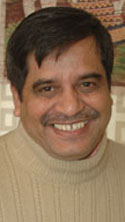 Professor Asoke Bhattacharya from the Adult
and Continuing Education and Extension Centre at Jadavpur University in Kolkata, visited SASNET and Lund University 16–17 March 2008. During the early spring 2008, Prof. Bhattacharya spent three months as a visiting scholar at the Danish University for Pedagogy in Copenhagen. His research focuses on the work by the 19th Century Danish priest, poet and writer N F S Grundtvig, considered to be a pioneer within
the field of adult education, and while in Denmark Prof. Bhattacharya’s new book titled ”Education for
the People” was launched during a function at the Centre for Grundtvig Studies, University of Aarhus. Professor Asoke Bhattacharya from the Adult
and Continuing Education and Extension Centre at Jadavpur University in Kolkata, visited SASNET and Lund University 16–17 March 2008. During the early spring 2008, Prof. Bhattacharya spent three months as a visiting scholar at the Danish University for Pedagogy in Copenhagen. His research focuses on the work by the 19th Century Danish priest, poet and writer N F S Grundtvig, considered to be a pioneer within
the field of adult education, and while in Denmark Prof. Bhattacharya’s new book titled ”Education for
the People” was launched during a function at the Centre for Grundtvig Studies, University of Aarhus.
Besides visiting SASNET (that Prof. Bhattacharya has a long-standing relation with) he also met researchers at Lund University’s Dept. of Education, discussing possible new collaboration projects.
 Associate Professor Aida
Aragão-Lagergren, Dept. of Social and Economic Geography, Uppsala University, visited the SASNET root node office in Lund on Wednesday 19 March 2008. She informed about the status of her ongoing research project focusing on ”Children left behind.
A study on children of migrant women in Sri Lanka”, carried out in collaboration with Prof. Kumudu
Wijewardena, University of Sri Jayewardenepura (SJP),
Sri Lanka. The project was initially given a SASNET planning grant, and later on awarded major research grants from Sida/SAREC and the Swedish Research Council. More
information, including an abstract to the project (only in Swedish). Associate Professor Aida
Aragão-Lagergren, Dept. of Social and Economic Geography, Uppsala University, visited the SASNET root node office in Lund on Wednesday 19 March 2008. She informed about the status of her ongoing research project focusing on ”Children left behind.
A study on children of migrant women in Sri Lanka”, carried out in collaboration with Prof. Kumudu
Wijewardena, University of Sri Jayewardenepura (SJP),
Sri Lanka. The project was initially given a SASNET planning grant, and later on awarded major research grants from Sida/SAREC and the Swedish Research Council. More
information, including an abstract to the project (only in Swedish).
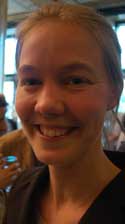 The SASNET board met
in Lund on Tuesday 5 February 2008. Decisions were taken that SASNET should establish a sub-network for
students interested in South Asia related studies. PhD candidate Malin Gregersen (photo), Dept. of History, Lund University, will be engaged to create a to web based students forum on SASNET’s web site. The SASNET board met
in Lund on Tuesday 5 February 2008. Decisions were taken that SASNET should establish a sub-network for
students interested in South Asia related studies. PhD candidate Malin Gregersen (photo), Dept. of History, Lund University, will be engaged to create a to web based students forum on SASNET’s web site.
During 2008, SASNET will concentrate on developing the South Asian Studies network in Sweden, through visits to different universities, such as Göteborg, Karlstad, Kalmar, Linköping, and
Malmö. In April, SASNET will also co-organise a workshop in
collaboration with the Sweden India Business Council (SIBC). The main event during the year will however be the organisation of the SASNET funded conference on “Nature, Knowledge, Power” in August 2008, in collaboration
with Uppsala University.
Moreover, in January 2009, plans are under way for a conference on health and social care of marginalized
groups, to be held in Colombo, Sri Lanka, with invited scholars from both Sweden and South Asia. This conference would be the first outcome of the discussions that were held at the SASNET South Asian Reference Group meeting in November 2007, to form SASNET sub-networks for specific issues. Read the verified Minutes.
 On Wednesday 12 March 2008, SASNET’s deputy director Lars Eklund visited the Institute for Security and Development Policy (ISDP) in Nacka-Stockholm. A fruitful meeting was organised by ISDP’s deputy director Robert Nilsson, in order for Lars to present SASNET to the Director Niklas Swanström and other ISDP researchers currently working on projects related to South Asia and Afghanistan. ISDP was established as an independent research institute as late as October 2007 but has its roots in the Silk Road Studies Program that was launched at Uppsala University in 2002.
The Institute is dedicated to expanding understanding of international affairs, particularly the interrelationship between the issue areas of conflict, security and development, and has a core funding from the Swedish government/Ministry of Foreign Affairs. It has two constituent parts: the Central Asia-Caucasus Institute & Silk Road Studies Program ((CACI & SRSP) run in collaboration with the Johns Hopkins University’s School of Advanced International Studies in Washington D.C., USA; and the Asia Program oriented towards the Eastern part of the Eurasian continent including South Asia. More information about ISDP. On Wednesday 12 March 2008, SASNET’s deputy director Lars Eklund visited the Institute for Security and Development Policy (ISDP) in Nacka-Stockholm. A fruitful meeting was organised by ISDP’s deputy director Robert Nilsson, in order for Lars to present SASNET to the Director Niklas Swanström and other ISDP researchers currently working on projects related to South Asia and Afghanistan. ISDP was established as an independent research institute as late as October 2007 but has its roots in the Silk Road Studies Program that was launched at Uppsala University in 2002.
The Institute is dedicated to expanding understanding of international affairs, particularly the interrelationship between the issue areas of conflict, security and development, and has a core funding from the Swedish government/Ministry of Foreign Affairs. It has two constituent parts: the Central Asia-Caucasus Institute & Silk Road Studies Program ((CACI & SRSP) run in collaboration with the Johns Hopkins University’s School of Advanced International Studies in Washington D.C., USA; and the Asia Program oriented towards the Eastern part of the Eurasian continent including South Asia. More information about ISDP.
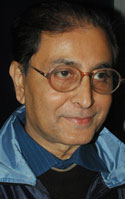 Dr. Soumyajit Samantha from North Bengal University in Siliguri, India, held a SASNET lecture in Lund on Monday 10 March 2008. He lectured on ”From Salman Rushdie to Arundhati Roy – Modern Indian Novels as Analysis of
Changing India and as World Literature”. The seminar was organised in collaboration with the Association of Foreign Affairs (UPF) and the Dept. of Comparative Literature, Lund University. Dr. Samantha was invited to Sweden with the help of a SASNET guest lecture tour grant, to hold lectures at Lund University and Växjö University. During his stay in Lund, he was accommodated by Prof. Staffan Lindberg, SASNET’s former Director. More information. Dr. Soumyajit Samantha from North Bengal University in Siliguri, India, held a SASNET lecture in Lund on Monday 10 March 2008. He lectured on ”From Salman Rushdie to Arundhati Roy – Modern Indian Novels as Analysis of
Changing India and as World Literature”. The seminar was organised in collaboration with the Association of Foreign Affairs (UPF) and the Dept. of Comparative Literature, Lund University. Dr. Samantha was invited to Sweden with the help of a SASNET guest lecture tour grant, to hold lectures at Lund University and Växjö University. During his stay in Lund, he was accommodated by Prof. Staffan Lindberg, SASNET’s former Director. More information.
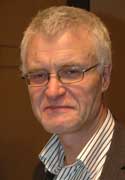 |
 |
Dr. Hans Blomkvist and Dr. Katrin Uba from the Dept. of Government, Uppsala University, held a joint SASNET seminar in Lund on Thursday 13 March 2008. Prof. Blomkvist, currently doing research on institutions and political decision making in India on energy and bioenergy in particular, talked about ”Energy Challenges in India's Rapidly
Growing Economy”. Dr. Uba, who defended her PhD thesis in 2007 on political activism in developing countries, talked about ”Protests against privatisation
and their outcomes in India”. Her presentation provides an overview of the privatisation process in India from 1991 till 2003, actors opposing the process, and the eventual impact of protest mobilisation. More information.
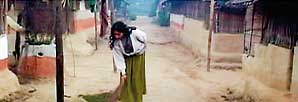 The documentary film ”Killing Time”, focusing on the Bhutanese refugees now living in camps in Nepal, was shown at an open SASNET seminar in Lund on Wednesday 6 February 2008, 15.00–17.00. The film is made by the Swedish-Canadian Director Annika Gustafson, and follows the people who were forced to leave Bhutan after the the Buddhist King of Bhutan in the late 1980s implemented strict cultural laws directly affecting the life and religious freedom of the Hindu population in the south. It includes interviews with Nisha Varia, Asia Specialist, Human Rights Watch, New York; Eve Lester, Refugee Coordinator, Amnesty International, London; Abraham Abraham, Country Director, UNHCR, Nepal; Donna Galwa, Security Officer, UNHCR, Nepal; and Daw Penjo, Bhutanese Ambassador to the UN, New York. The screening of the film, organised in collaboration with the Centre for East and South-East Asian Studies, Lund University, was followed by an open discussion with the Director herself, about refugees, religion, development aid, exile, war, education, and the Gross National Happiness concept. Annika Gustafson was interviewed in Sydsvenskan the same day, read the article titled ”Filmare hittade bortglömd flyktingkatastrof” (as a pdf-file, in Swedish) The documentary film ”Killing Time”, focusing on the Bhutanese refugees now living in camps in Nepal, was shown at an open SASNET seminar in Lund on Wednesday 6 February 2008, 15.00–17.00. The film is made by the Swedish-Canadian Director Annika Gustafson, and follows the people who were forced to leave Bhutan after the the Buddhist King of Bhutan in the late 1980s implemented strict cultural laws directly affecting the life and religious freedom of the Hindu population in the south. It includes interviews with Nisha Varia, Asia Specialist, Human Rights Watch, New York; Eve Lester, Refugee Coordinator, Amnesty International, London; Abraham Abraham, Country Director, UNHCR, Nepal; Donna Galwa, Security Officer, UNHCR, Nepal; and Daw Penjo, Bhutanese Ambassador to the UN, New York. The screening of the film, organised in collaboration with the Centre for East and South-East Asian Studies, Lund University, was followed by an open discussion with the Director herself, about refugees, religion, development aid, exile, war, education, and the Gross National Happiness concept. Annika Gustafson was interviewed in Sydsvenskan the same day, read the article titled ”Filmare hittade bortglömd flyktingkatastrof” (as a pdf-file, in Swedish)
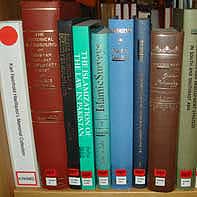 Through its involvement with the Masters Programme in Asian Studies (including a South Asia track), SASNET has been actively working to open up the Lund University’s Asia
Library to include South Asia related literature (besides its existing collections of literature on East and South-East Asia). Since a couple of years, the course literature for the Masters programme is available in the Asia Library (Asienbiblioteket, at the
ground floor in the same building as the Centre for East and South-East Asian Studies, ACE, but with its entrance from Scheelevägen
15 C). In January 2007, the SASNET board decided to set aside SEK 25 000 to buy and catalogue books on modern South Asian studies for the Asia Library. A number of books from SASNET’s root node office collection (more information) were also donated to the Asia Library.
From October 2007, a list of SASNET’s first contribution of more than 100 volumes is available through the Asia Library web page. Go for the 2007 list of South Asia books in Lund University’s Asia
Library (as a pdf-file). Through its involvement with the Masters Programme in Asian Studies (including a South Asia track), SASNET has been actively working to open up the Lund University’s Asia
Library to include South Asia related literature (besides its existing collections of literature on East and South-East Asia). Since a couple of years, the course literature for the Masters programme is available in the Asia Library (Asienbiblioteket, at the
ground floor in the same building as the Centre for East and South-East Asian Studies, ACE, but with its entrance from Scheelevägen
15 C). In January 2007, the SASNET board decided to set aside SEK 25 000 to buy and catalogue books on modern South Asian studies for the Asia Library. A number of books from SASNET’s root node office collection (more information) were also donated to the Asia Library.
From October 2007, a list of SASNET’s first contribution of more than 100 volumes is available through the Asia Library web page. Go for the 2007 list of South Asia books in Lund University’s Asia
Library (as a pdf-file).
Go for the 2008 list (as a pdf-file)
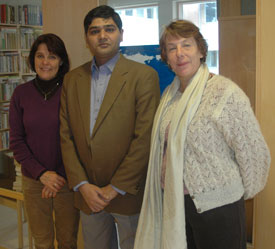 |
Muhammad Amir Rana, Director of the Pak Institute for Peace Studies (PIPS) in Lahore, Pakistan, visited SASNET’s office in Lund on Thursday 25 October 2007. Mr. Rana, who is a renowned expert on terrorism and regional strategic issues, and in 2004 wrote the book "A to Z of Jihad organizations
in Pakistan", has been invited to Sweden by the Dept. of Political Science at Lund University since the department is currently establishing a collaboration with PIPS. During his stay in Lund, he will also hold a lecture at the Dept. of Political Science on 'Pakistan and the radicalization of Islam and the upcoming election'.
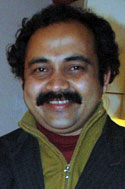 Mr. Sunandan Roy Chowdhury, Editor-Publisher of the Sampark Journal of Global Understanding in Kolkata, India, gave a SASNET lecture on ”Ideology of Nation State and Educational Policy”, focusing on Indian Higher education since 1947, at Lund University on Tuesday 23 October 2007, 15.15–17.00. Mr. Roy Chowdhury, who is also a researcher in didactics and participated as a key speaker at SASNET’s workshop on ”The Role of South Asia in
the Internationalisation of
Higher Education in Sweden” (held at Karolinska Institutet in Stockholm, November 2006, more information) critiques the skewed elitist development of higher education and shows how various policy options that could have created a more equitable and just society fell by the wayside as India rushed towards modernity. Venue: Centre for East and South-East Asian Studies, Java Hall, Alfa 1 building (ground floor), Scheelevägen 15 A, Lund. Mr. Sunandan Roy Chowdhury, Editor-Publisher of the Sampark Journal of Global Understanding in Kolkata, India, gave a SASNET lecture on ”Ideology of Nation State and Educational Policy”, focusing on Indian Higher education since 1947, at Lund University on Tuesday 23 October 2007, 15.15–17.00. Mr. Roy Chowdhury, who is also a researcher in didactics and participated as a key speaker at SASNET’s workshop on ”The Role of South Asia in
the Internationalisation of
Higher Education in Sweden” (held at Karolinska Institutet in Stockholm, November 2006, more information) critiques the skewed elitist development of higher education and shows how various policy options that could have created a more equitable and just society fell by the wayside as India rushed towards modernity. Venue: Centre for East and South-East Asian Studies, Java Hall, Alfa 1 building (ground floor), Scheelevägen 15 A, Lund.
On 22 October 2007, the
Swedish Parliament’s Foreign Affairs Committee visited Lund University. The purpose was to introduce
the members to ongoing activities and research at Lund University of relevance for Swedish
politicians with regard to international issues. Three sessions
were held, with the following titles: ”Perspective Africa”, ”Perspective The Middle East”,
and ”Perspective Asia”. SASNET’s Director Anna Lindberg was invited to introduce SASNET and some of its activities, and
she also spoke on the topic ”The New India: A Trade and Research Nation”. Dr.
Sidsel Hansson from the Centre for East and South-East Asian Studies (ACE), and Associate Professor Catarina Kinnvall, Dept. of Political Science, also made a presentation
with the title ”Religion and Security Threats in India and Pakistan”. The
following politicians participated:
Göran Lennmarker (m), Kerstin Lundgren (c), Walburga Habsburg Douglas (m),
Kenneth Forslund (s), and Björn Hamilton (m). See the programme for the day (as a pdf-file)
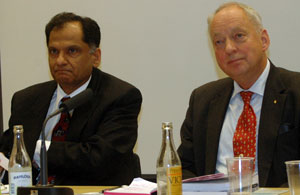 A well-attended seminar on ”Global Terrorism: Myth or Reality” was held in Lund on Wednesday 10 October 2007, 19.30–21.15. The seminar was organised by SASNET in collaboration with the Centre for Middle Eastern Studies and the Association of Foreign Affairs at Lund University. The Ambassador of Pakistan to Sweden, H.E. Mr. Shaheen A. Gillani was the key speaker to talk about the theme for the evening, questioning the use of the concept ”terrorism” only by individuals and groups but excluding the prevalent cases of state terrorism.
Other speakers at the seminar were
Prof. Bo Huldt from the Swedish National Defence College in Stockholm, who talked about ”Is Terrorism the Model for Warfare in the New Millennium?”,
Dr. Maria Bjernevi, former Senior Analyst at the Swedish Security Service (Säpo), who talked about ”Global Jihad, Local Terrorism”, and
Iram Asif from Copenhagen University, who talked about ”Behind the Screen: Young Women of Jamia
Hafsa”. More information. A well-attended seminar on ”Global Terrorism: Myth or Reality” was held in Lund on Wednesday 10 October 2007, 19.30–21.15. The seminar was organised by SASNET in collaboration with the Centre for Middle Eastern Studies and the Association of Foreign Affairs at Lund University. The Ambassador of Pakistan to Sweden, H.E. Mr. Shaheen A. Gillani was the key speaker to talk about the theme for the evening, questioning the use of the concept ”terrorism” only by individuals and groups but excluding the prevalent cases of state terrorism.
Other speakers at the seminar were
Prof. Bo Huldt from the Swedish National Defence College in Stockholm, who talked about ”Is Terrorism the Model for Warfare in the New Millennium?”,
Dr. Maria Bjernevi, former Senior Analyst at the Swedish Security Service (Säpo), who talked about ”Global Jihad, Local Terrorism”, and
Iram Asif from Copenhagen University, who talked about ”Behind the Screen: Young Women of Jamia
Hafsa”. More information.
The following day, on Thursday 11 October, the Pakistani Ambassador Shaheen A. Gillani made a visit to SASNET’s root node office at Scheelevägen. SASNET’s Director Anna Lindberg, and Deputy Director Lars Eklund presented the Swedish South Asian Studies Network. During his visit to Lund University, he also visited the Centre for Middle Eastern Studies, and had lunch with the University Director Marianne Granfelt.
A delegation from Anand Agricultural University, consisting of Dr. A.K. Pathak, Director of Research at AAU, and Dr. J.B. Prajapati who is Coordinator of the so-called SASNET Fermented Foods project, visited SASNET on 2 October 2007. It was made in connection to a visit to Lund University, where an extensive programme had been prepared for them to visit several departments, but also including an important meeting with representatives for the Rector’s office, Lund Institute of Technology. This meeting was aimed at facilitating a long-term collaboration between the Food departments of LTH/LU and related faculties of Anand Agricultural University.
The Ambassador of India to Sweden, Ms. Deepa Gopalan Wadhwa, and the First Secretary, Mr. Rajesh Vaishnaw, came to Lund to participate in this meeting, that was being organised by Prof. Baboo Nair, Dept. of Applied nutrition, LTH. Since SASNET was instrumental in the creation of the SASNET Fermented Foods Network, giving initial funding, the delegation also made a courtesy call to the SASNET office on Tuesday 2 October. An informal meeting was organised by SASNET (Anna Lindberg and Lars Eklund) in the conference room at the Centre for East and South-East Asian Studies (ACE), Scheelevägen 15 D. More information.
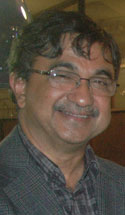 Professor Priyankar Upadyaya, Director at the Malaviya Centre for Peace Research at Banaras Hindu University, Varanasi, India, held a SASNET lecture at Lund University on Tuesday 25 September 2007, 13.15–15.00, about ”Naxal Violence in India.
Security Threat or Failure of Governance?”. The lecture was organised in collaboration with Lund University’s Dept. of Economic History. Prof. Upadhyaya’s presentation unravels the dynamic of the maost/naxalite rebellion in India’s 'Red Corridor', stretching from Nepal to Andhra Pradesh, and whether its exclusive treatment as a security threat tends to obfuscate the generic issues of skewed democracy and development. Venue: Conference room, Centre for East and South-East Asian Studies (ACE), Scheelevägen 15 D, 1st floor. Professor Upadhyaya, who has old Swedish connections to the Dept. of Peace and Conflict Research, Uppsala University, and the Dept. of Religious Studies, Karlstad University, also made a visit to the SASNET root node office for a meeting withe Anna Lindberg and Lars Eklund, SASNET, and Neelambar Hatti, Dept. of Economic History. More information about Prof. Upadhyaya. Professor Priyankar Upadyaya, Director at the Malaviya Centre for Peace Research at Banaras Hindu University, Varanasi, India, held a SASNET lecture at Lund University on Tuesday 25 September 2007, 13.15–15.00, about ”Naxal Violence in India.
Security Threat or Failure of Governance?”. The lecture was organised in collaboration with Lund University’s Dept. of Economic History. Prof. Upadhyaya’s presentation unravels the dynamic of the maost/naxalite rebellion in India’s 'Red Corridor', stretching from Nepal to Andhra Pradesh, and whether its exclusive treatment as a security threat tends to obfuscate the generic issues of skewed democracy and development. Venue: Conference room, Centre for East and South-East Asian Studies (ACE), Scheelevägen 15 D, 1st floor. Professor Upadhyaya, who has old Swedish connections to the Dept. of Peace and Conflict Research, Uppsala University, and the Dept. of Religious Studies, Karlstad University, also made a visit to the SASNET root node office for a meeting withe Anna Lindberg and Lars Eklund, SASNET, and Neelambar Hatti, Dept. of Economic History. More information about Prof. Upadhyaya.
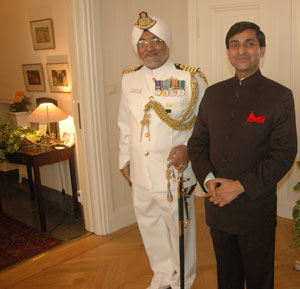 |
On 15 August 2007, SASNET’s Director, Dr. Anna Lindberg, and Deputy Director, Mr. Lars Eklund, visited Stockholm in order to participate in the celebration of the 60th anniversary day of Indian independence, on invitation from the Indian Ambassador, Mrs. Deepa Gopalan Wadhwa. A large gathering of diplomats, university and business people, artists and journalists gathered at the the festive event in central Stockholm.
Later the same day, Anna and Lars visited the International Programme Office for Education and Training (Internationella Programkontoret) at Kungsholmen, and had a meeting with the administrator Eva Ehdwall. The International Programme Office for Education and Training is a Swedish government agency that comes under the Education and Culture Department. It administers some 60 different programmes and activities aimed at internationalising education, and is the authority in charge for two programmes of much interest for South Asian studies in Sweden, namely the Linnaeus Palme International Exchange Programme and the Minor Field Studies grants. They also administer another interesting form of grants, Sida’s travel grants for Swedish students who wish to do field work at an United Nations institution anywhere in the World, including South Asia.
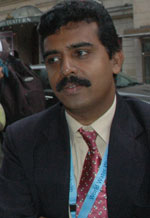 From Kungsholmen, Anna and Lars went to make a short visit to the ongoing World Water Week conference, organised 12–18 August by the Stockholm International Water Institute (SIWI) in the Stockholm City Conference Centre. Hundreds of South Asian researchers participate in this major yearly conference, and we had a meeting with Dr Prakash Nelliyat (photo), environmental economist from Madras School of Economics, Chennai, India, who has old links with SASNET. More information about Dr. Nelliyat. From Kungsholmen, Anna and Lars went to make a short visit to the ongoing World Water Week conference, organised 12–18 August by the Stockholm International Water Institute (SIWI) in the Stockholm City Conference Centre. Hundreds of South Asian researchers participate in this major yearly conference, and we had a meeting with Dr Prakash Nelliyat (photo), environmental economist from Madras School of Economics, Chennai, India, who has old links with SASNET. More information about Dr. Nelliyat.

Since 1 July 2007, Anna Lindberg is the new SASNET Director. Dr.
Lindberg, till recently Assistant Professor at Penn State University
in USA, has been appointed Director/Coordinator for SASNET on
a 50 % basis from 1 July 2007 to 31 December 2009. Besides working
as Director for SASNET, Anna Lindberg will also continue with an
ongoing research project on ”Marriage traditions
in South India from 1930 to the present”, being
affiliated with Lund University’s Centre
for East and South-East Asian Studies (ACE). The historian
Anna Lindberg now succeeds Professor Staffan Lindberg, the driving
force behind the creation of the Swedish South Asian Studies Network
in the year 2000 and its Director since the formal launch
of SASNET in 2001. In an open letter, Anna Lindberg declares her
ambitions as Director for SASNET. Read
her statement.
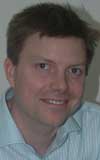 Dr.
Stefan Jonsson from the Swedish Institute for Growth Policy
Studies (ITPS) visited SASNET’s root node office in Lund on Tuesday
19 June 2007. From the middle of August 2007,
Stefan Jonsson (photo
to the right), will be based at the
Swedish Embassy in New Delhi, working as Counsellor
for Science and Technology. He has a background in Economics
from the Centre
for Research on Innovation and Industrial Dynamics (CIND),
Uppsala University and most recently at Stockholm
School of Economics. In the early 1990s he was working for
some years with the Swedish Sida supported Social Forestry project
carried out in the Indian state of Orissa. His mission for ITPS
consists to a large extent in establishing contacts within the
fields of research and science, and that was the reason for his
visit to Lund to meet SASNET’s Director, Prof. Staffan Lindberg,
and its Deputy Director Lars Eklund. While in Lund he also met
Prof. Rajni Hatti-Kaul at the Dept. of Biotechnology, involved
in several research projects connected to India. More
information. Dr.
Stefan Jonsson from the Swedish Institute for Growth Policy
Studies (ITPS) visited SASNET’s root node office in Lund on Tuesday
19 June 2007. From the middle of August 2007,
Stefan Jonsson (photo
to the right), will be based at the
Swedish Embassy in New Delhi, working as Counsellor
for Science and Technology. He has a background in Economics
from the Centre
for Research on Innovation and Industrial Dynamics (CIND),
Uppsala University and most recently at Stockholm
School of Economics. In the early 1990s he was working for
some years with the Swedish Sida supported Social Forestry project
carried out in the Indian state of Orissa. His mission for ITPS
consists to a large extent in establishing contacts within the
fields of research and science, and that was the reason for his
visit to Lund to meet SASNET’s Director, Prof. Staffan Lindberg,
and its Deputy Director Lars Eklund. While in Lund he also met
Prof. Rajni Hatti-Kaul at the Dept. of Biotechnology, involved
in several research projects connected to India. More
information.
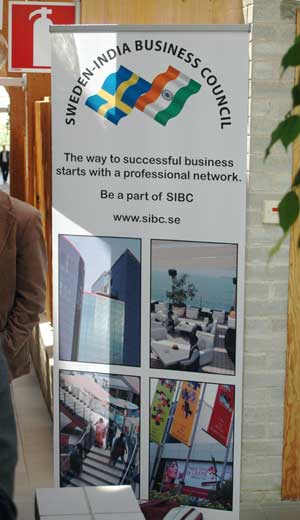 On
Wednesday 23 May 2007, the Sweden-India Business Council (SIBC)
organised a successful afternoon seminar in Lund titled ”The
New India” (Det nya Indien) in collaboration with SASNET
and Ideon Science Park. It attracted around 50 people
from companies in South Sweden and from Lund University. SASNET’s
Director, Prof. Staffan Lindberg, was the moderator for the day,
and he also lectured about ”Vad är nytt med Indien – förändringar
de senaste 25 åren”. Other participants included
Susanna Bill, Innovations Manager at Sony Ericsson Mobile Communications
AB in Lund. She talked about
”How to Unleash the Power of Emerging Markets”,
based on Sony Ericsson’s experiences. Anne-Charlotte Sukhia
from ACS Interkulturell Utbildning discussed cultural differences
in business life, and Ingemar Ljungdahl from CTO Telelogic AB presented
the development of Telelogic AB in the Indian market. Read
a report from the business seminar in Lund. On
Wednesday 23 May 2007, the Sweden-India Business Council (SIBC)
organised a successful afternoon seminar in Lund titled ”The
New India” (Det nya Indien) in collaboration with SASNET
and Ideon Science Park. It attracted around 50 people
from companies in South Sweden and from Lund University. SASNET’s
Director, Prof. Staffan Lindberg, was the moderator for the day,
and he also lectured about ”Vad är nytt med Indien – förändringar
de senaste 25 åren”. Other participants included
Susanna Bill, Innovations Manager at Sony Ericsson Mobile Communications
AB in Lund. She talked about
”How to Unleash the Power of Emerging Markets”,
based on Sony Ericsson’s experiences. Anne-Charlotte Sukhia
from ACS Interkulturell Utbildning discussed cultural differences
in business life, and Ingemar Ljungdahl from CTO Telelogic AB presented
the development of Telelogic AB in the Indian market. Read
a report from the business seminar in Lund.
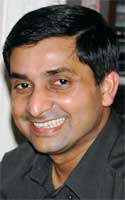 Mr.
Rajesh Vaishnaw (photo to the right), First Secretary (Press,
Information, Culture) at the Embassy of India in Stockholm visited
Lund University 9–11
May 2007.
The programme was prepared by SASNET and included visits
to the Division
of Indic Religions, the Dept. of Applied
Nutrition and Food Chemistry,
the Dept. of Medical Microbiology, Dermatology
and Infection,
and the Dept. of Biotechnology, besides
meeting individual researchers from the
Dept. of Political Science and the Human
Ecology Division. He also had a fruitfful meeting with students
from the Masters Programme in Asian Studies at Lund University,
organised by the Centre
for East and South-East Asian Studies (ACE), and had a meeting
with Klas Malmqvist, Pro Rector for Lund University’s Faculty
of Engineering (Lunds Tekniska Högskola, LTH). More
information. Mr.
Rajesh Vaishnaw (photo to the right), First Secretary (Press,
Information, Culture) at the Embassy of India in Stockholm visited
Lund University 9–11
May 2007.
The programme was prepared by SASNET and included visits
to the Division
of Indic Religions, the Dept. of Applied
Nutrition and Food Chemistry,
the Dept. of Medical Microbiology, Dermatology
and Infection,
and the Dept. of Biotechnology, besides
meeting individual researchers from the
Dept. of Political Science and the Human
Ecology Division. He also had a fruitfful meeting with students
from the Masters Programme in Asian Studies at Lund University,
organised by the Centre
for East and South-East Asian Studies (ACE), and had a meeting
with Klas Malmqvist, Pro Rector for Lund University’s Faculty
of Engineering (Lunds Tekniska Högskola, LTH). More
information.
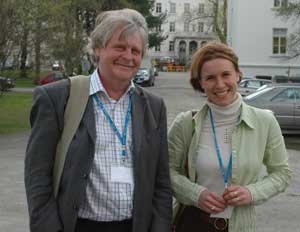 |
Every
year, the Finnish Centre for
International Mobility (CIMO) organises
workshops for the International coordinators at the universities
in Finland. The 2007 workshop was held 14–16
May in Seinäjoki in central Finland
with more than 400 participants from all the Finnish universities.
The conference included a session about academic collaboration
with India in a Nordic perspective. SASNET’s
Deputy Director Lars Eklund had been invited as a key speaker
to present the activities of the Swedish South
Asian Studies Network, and experiences from
Indo-Swedish academic collaboration. His presentation was commented
upon by Hannele Ahti from CIMO. Hannele Teir and Juha Tähkämaa,
representatives for the two Finnish University Networks for East
and Southeast Asian Studies, also participated in the seminar.
CIMO operates under the Finnish Ministry of Education, and offers
services and expertise to encourage cross-cultural communication.
On 1 January 2007, CIMO opened up a new scholarship programme,
which focuses on supporting the expert exchanges between Finland
and India. The Fellowships programme is funded by Sitra, the
Finnish Innovation Fund.
The aim of the programme is to encourage academic mobility between
Finland and India, and to support the internationalisation of
research and education by strengthening the cooperation between
Finnish and Indian universities and research institutes. See
the complete programme for the Seinöjoki
workshop (in Finnish only).
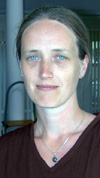 New
Board for SASNET from 1 January 2007. On Thursday 9
November 2006, Lund University Vice-Chancellor Göran Bexell
decided the new composition of SASNET’s board from 1 January
2007 to 31 December 2009. The board is chaired by Associate
Professor Gunnel Cederlöf (photo to the right), Dept.
of History, Uppsala University. Besides her, the board
consists of three representatives for Lund University (that
funds SASNET with a third of its budget), two representatives
for other Swedish universities, one representative for PhD
candidates, one representative for other Nordic universities,
and one representative for Swedish NGOs. Full
information about the new board. New
Board for SASNET from 1 January 2007. On Thursday 9
November 2006, Lund University Vice-Chancellor Göran Bexell
decided the new composition of SASNET’s board from 1 January
2007 to 31 December 2009. The board is chaired by Associate
Professor Gunnel Cederlöf (photo to the right), Dept.
of History, Uppsala University. Besides her, the board
consists of three representatives for Lund University (that
funds SASNET with a third of its budget), two representatives
for other Swedish universities, one representative for PhD
candidates, one representative for other Nordic universities,
and one representative for Swedish NGOs. Full
information about the new board.
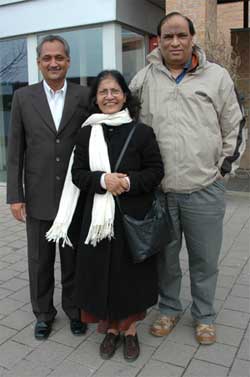 Dr.
Kazi Ali Toufique from Bangladesh and Prof. R. Parthasarathy
from India participate in a SASNET seminar about fish production
and aquaculture in India and Bangladesh in Lund on Thursday
15 March, 13.15–16.00. Dr. Kazi Ali Toufique is affiliated
to Bangladesh Institute for
Development Studies in Dhaka, and
he talked about ”Floodplain Aquaculture in Bangladesh:
A case of Enchantment or Disenchantment?". Prof. R.
Parthasarathy from the Gujarat
Institute of Development Research in Gota, Ahmedabad,
India, talked about ”Governance
Issues in Natural Resources Management: The case of Fisheries
in India”. Prof. Both Prof. Parthasarathy and Dr.
Toufique and (seen on the photo above, along with Dr. Alia
Ahmad) visited Sweden to participate in a three-days workshop
on ”Community Management of Openwater Inland Fisheries
in Bangladesh and India” being held in Lund 14–17
March (more information). The
seminar was organised in collaboration with the Dept.
of Economics,
and was also part of a SASNET lectures series intended for the
Lund University Masters students in Asian Studies as part of
their training. Dr.
Kazi Ali Toufique from Bangladesh and Prof. R. Parthasarathy
from India participate in a SASNET seminar about fish production
and aquaculture in India and Bangladesh in Lund on Thursday
15 March, 13.15–16.00. Dr. Kazi Ali Toufique is affiliated
to Bangladesh Institute for
Development Studies in Dhaka, and
he talked about ”Floodplain Aquaculture in Bangladesh:
A case of Enchantment or Disenchantment?". Prof. R.
Parthasarathy from the Gujarat
Institute of Development Research in Gota, Ahmedabad,
India, talked about ”Governance
Issues in Natural Resources Management: The case of Fisheries
in India”. Prof. Both Prof. Parthasarathy and Dr.
Toufique and (seen on the photo above, along with Dr. Alia
Ahmad) visited Sweden to participate in a three-days workshop
on ”Community Management of Openwater Inland Fisheries
in Bangladesh and India” being held in Lund 14–17
March (more information). The
seminar was organised in collaboration with the Dept.
of Economics,
and was also part of a SASNET lectures series intended for the
Lund University Masters students in Asian Studies as part of
their training.
In collaboration with the Centre
for East and South-East Asian Studies (ACE), SASNET organised
a series a public lectures and seminars during the Spring 2007.
The lectures were also be attended by the Lund University Masters
students in Asian Studies, as part of their training. See
the poster for the public lectures/seminars series.
On Monday 26 March 2007, 13–15, Ravinder Kaur,
Post-doctoral Fellow, Roskilde University, gave a lecture about ”Islam
between East and West – the political situation in Pakistan and Afghanistan”.
Venue: Department of Sociology, Paradisgatan 5, House G, Ground floor Hall 3,
Lund.
On Tuesday 3 April 2007, 09–11, Dr. Camilla Orjuela,
Researcher at the Dept. of Peace and Development Studies,
School of Global Studies, Göteborg University, lectured about ”Ethnicity
and Violent Conflict in Sri Lanka”. Venue: Java Hall, Alfa 1, Ground
Floor, Scheelevägen 15 A, Lund.
On Tuesday 17 April, 09–11, Neil Webster, Senior
researcher at Development Studies, Danish Institute of International Studies
(DIIS), Copenhagen, lectured about ”Nepal: Kingdom versus Maoism”.
Venue: Java Hall, Alfa 1, Ground Floor, Scheelevägen 15 A, Lund.
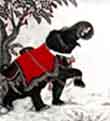 The 19th European Conference on Modern South Asian Studies (ECMSAS)
was successfully held 27–30 June 2006 in Leiden, the
Netherlands.
SASNET was also represented at the conference in Leiden. Prof.
Staffan Lindberg, Director of SASNET, chaired panel No. 32
on ”Post Green Revolution Agrarian Transformation
in South Asia: Ecology and Peasant Life under Globalization”,
and he also participated in a panel discussion on the formation
of ANERI, the Academic Network for European Research related
to India, initiated by the European Commission (and formally
launched during the Leiden conference), see
below. The 19th European Conference on Modern South Asian Studies (ECMSAS)
was successfully held 27–30 June 2006 in Leiden, the
Netherlands.
SASNET was also represented at the conference in Leiden. Prof.
Staffan Lindberg, Director of SASNET, chaired panel No. 32
on ”Post Green Revolution Agrarian Transformation
in South Asia: Ecology and Peasant Life under Globalization”,
and he also participated in a panel discussion on the formation
of ANERI, the Academic Network for European Research related
to India, initiated by the European Commission (and formally
launched during the Leiden conference), see
below.
More
information about the 19th ECMSAS conference in Leiden.
SASNET’s deputy director/webmaster Lars Eklund also participated in the
2006 conference, visited several panels and followed the discussions. Lars made
a photographic documentation. See
his photos from the Leiden conference.
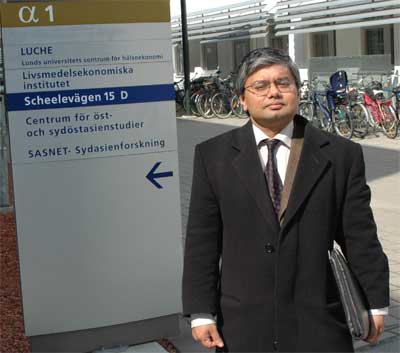 The
European Commission has decided to launch an Academic Network
for European Research related to India (ANERI). The
project aims to strengthen the ties between the European Union
and India, and seeks to promote funding for specific types of
India-focused research within the field of contemporary social
science. It might result in the setting up of a European Centre
for Indian Studies. The project is prepared by a team consisting
of Dr Willem van der Geest, European
Institute for Asian Studies (EIAS) in Brussels (team leader),
Dr Kunal
Sen, University of
East Anglia, UK (as economic analyst), and Dr Lawrence
Saez,
London School of Economics, UK (as political analyst). During
the Spring 2006 they visitied institutions and met researchers
all over Europe in order to work out a strategy for the network.
On Wednesday 3 May 2006 Dr. Kunal Sen (photo above)
came to Lund for a fruitful meeting with SASNET’s Staffan
Lindberg and Lars Eklund. Together they discussed the role SASNET
and Swedish researchers could possibly play in the further development
of ANERI. The
European Commission has decided to launch an Academic Network
for European Research related to India (ANERI). The
project aims to strengthen the ties between the European Union
and India, and seeks to promote funding for specific types of
India-focused research within the field of contemporary social
science. It might result in the setting up of a European Centre
for Indian Studies. The project is prepared by a team consisting
of Dr Willem van der Geest, European
Institute for Asian Studies (EIAS) in Brussels (team leader),
Dr Kunal
Sen, University of
East Anglia, UK (as economic analyst), and Dr Lawrence
Saez,
London School of Economics, UK (as political analyst). During
the Spring 2006 they visitied institutions and met researchers
all over Europe in order to work out a strategy for the network.
On Wednesday 3 May 2006 Dr. Kunal Sen (photo above)
came to Lund for a fruitful meeting with SASNET’s Staffan
Lindberg and Lars Eklund. Together they discussed the role SASNET
and Swedish researchers could possibly play in the further development
of ANERI.
The network was officially launched on Wednesday
28 June 2006 during the 19th European Conference for Modern South
Asian Studies held in Leiden. More
details about the ANERI project.
On Friday 5 March 2006 a delegation from
the Association of Bangladeshi Students (ABS), based at Chalmers
University of Technology and Göteborg
University, visited SASNET’s root node office in
Lund. Dr. M.S. Kabir, PhD candidate Raihan Rafique and PhD candidate
Biddut K. Banik, all from the Dept. of
Microtechnology & Nanoscience
(MC2) at Chalmers, had a fruitful discussion on common interests
with SASNET’s
director, Prof. Stafan Lindberg, and deputy director Lars Eklund.
ABS was established in 2003 to strengthen Sweden-Bangladesh educational
and cultural network and to explore scholarship/funding opportunities
for Bangladeshi students. The organisation is keen on SASNET’s collaboration in these
efforts. More information about the Association
of Bangladeshi Students.
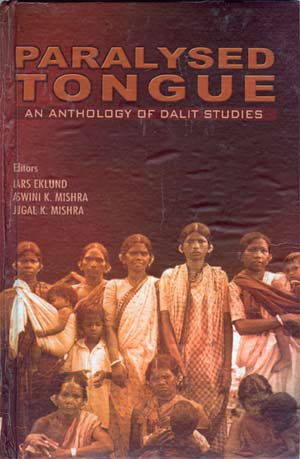 Lars
Eklund from SASNET was invited to attend a book release function
as honorary guest at Swosti Hotel in Bhubaneshwar, India, on 16
December 2005. The book, ”Paralysed
Tongue. An anthology of Dalit studies” (Pagemaker, Bhubaneshwar,
2005) incorporates several papers presented in a panel on Dalit
Literature at the 18th European Conference on Modern South Asian
Studies, organised by SASNET in Lund in June 2004. The book has
been edited by Aswini Kumar Mishra and Jugal K Mishra, and
deals with Dalit literature not only in different parts of India,
but also covers the other South Asian countries, including Nepal,
Bangladesh, Pakistan and Afghanistan. More
information on the book release function. Lars
Eklund from SASNET was invited to attend a book release function
as honorary guest at Swosti Hotel in Bhubaneshwar, India, on 16
December 2005. The book, ”Paralysed
Tongue. An anthology of Dalit studies” (Pagemaker, Bhubaneshwar,
2005) incorporates several papers presented in a panel on Dalit
Literature at the 18th European Conference on Modern South Asian
Studies, organised by SASNET in Lund in June 2004. The book has
been edited by Aswini Kumar Mishra and Jugal K Mishra, and
deals with Dalit literature not only in different parts of India,
but also covers the other South Asian countries, including Nepal,
Bangladesh, Pakistan and Afghanistan. More
information on the book release function.
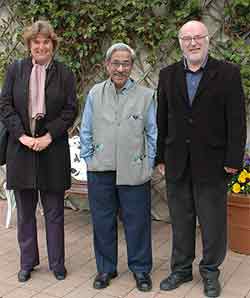 The three external evaluators who have have scrutinized the activities
of SASNET presented their final report to Sida/SAREC and Lund
University on Thursday 30 June 2005. During the second
week of May 2005 a team of three evaluators have visited the
SASNET root node at Lund; Sida/SAREC and the Foreign Ministry
in Stockholm, and SASNET partners at the universities of Stockholm,
Uppsala, Karlstad, Göteborg
and Lund. The evaluation group consisted of Prof. Ghanshyam
Shah, Political Scientist from Ahmedabad, India; Prof. Carla
Risseeuw, Dept. of Anthropology and Development Sociology,
University of Leiden, The Netherlands; and Mr. Lennart
Wohlgemut, Director of the Nordic Africa Institute
in Uppsala (team leader). The report was to become the basis for
SASNET’s
application for renewed funding from Sida/SAREC and Lund University
for the period 2006–2008. The evaluation group on the
photo above. Read the evaluation
report
(as a pdf-file) The three external evaluators who have have scrutinized the activities
of SASNET presented their final report to Sida/SAREC and Lund
University on Thursday 30 June 2005. During the second
week of May 2005 a team of three evaluators have visited the
SASNET root node at Lund; Sida/SAREC and the Foreign Ministry
in Stockholm, and SASNET partners at the universities of Stockholm,
Uppsala, Karlstad, Göteborg
and Lund. The evaluation group consisted of Prof. Ghanshyam
Shah, Political Scientist from Ahmedabad, India; Prof. Carla
Risseeuw, Dept. of Anthropology and Development Sociology,
University of Leiden, The Netherlands; and Mr. Lennart
Wohlgemut, Director of the Nordic Africa Institute
in Uppsala (team leader). The report was to become the basis for
SASNET’s
application for renewed funding from Sida/SAREC and Lund University
for the period 2006–2008. The evaluation group on the
photo above. Read the evaluation
report
(as a pdf-file)
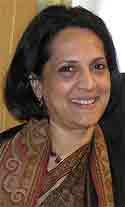 The Indian Ambassador to Sweden, Ms. Deepa Gopalan Wadhwa, along
with the First Secretary of the Embassy, Ms. Vani Rao, visited Lund
University on Monday 13 June 2005. The programme for the day,
prepared by SASNET, included visits to the Dept. of Biotechnology,
and the Section for Indic Religions at the Centre for Theology and
Religious Studies, where meetings were held with a large number
of South Asia related reserachers at Lund University. The Ambassador
also had meetings with the Vice-Chancellor Prof. Göran Bexell,
and with the SASNET root node staff. More
information on the visit. The Indian Ambassador to Sweden, Ms. Deepa Gopalan Wadhwa, along
with the First Secretary of the Embassy, Ms. Vani Rao, visited Lund
University on Monday 13 June 2005. The programme for the day,
prepared by SASNET, included visits to the Dept. of Biotechnology,
and the Section for Indic Religions at the Centre for Theology and
Religious Studies, where meetings were held with a large number
of South Asia related reserachers at Lund University. The Ambassador
also had meetings with the Vice-Chancellor Prof. Göran Bexell,
and with the SASNET root node staff. More
information on the visit.
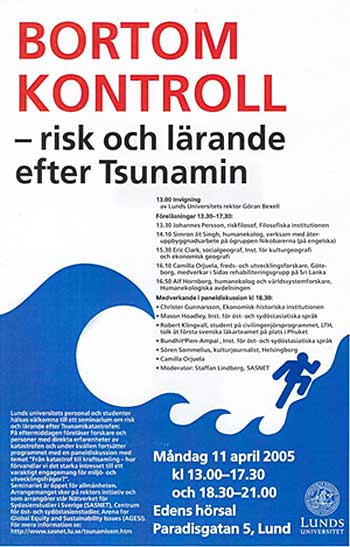 In collaboration with Lund University’s Centre for East and
South-East Asian Studies (ACE), and AGESI
(a Lund University network dealing with global equity and sustainability
issues) SASNET organised a public seminar on ”Beyond Control
– Risk and Learning after the Tsunami” on Monday 11
April 2005. It consisted of lectures focusing on different
aspects of risk and disaster management, and a panel discussion.
Among the lecturers were Dr. Simron Jit Singh from the University
of Vienna and Dr Camilla Orjuela, Dept. of Peace and Development
Research, Göteborg University. Read
a summary of the post-Tsunami seminar, written by Sabina Andrén,
AGESI. In collaboration with Lund University’s Centre for East and
South-East Asian Studies (ACE), and AGESI
(a Lund University network dealing with global equity and sustainability
issues) SASNET organised a public seminar on ”Beyond Control
– Risk and Learning after the Tsunami” on Monday 11
April 2005. It consisted of lectures focusing on different
aspects of risk and disaster management, and a panel discussion.
Among the lecturers were Dr. Simron Jit Singh from the University
of Vienna and Dr Camilla Orjuela, Dept. of Peace and Development
Research, Göteborg University. Read
a summary of the post-Tsunami seminar, written by Sabina Andrén,
AGESI.
SASNET successfully arranged the 18th European
Conference on Modern South Asian Studies in Lund 6–9 July
2004. With 360 participants from all over the World actually
turning up (including a large number of PhD candidates and participants
from from South Asia itself) it was the largest ECMSAS conference
so far, and certainly the largest gathering ever on Swedish soil
of South Asia oriented researchers, covering all fields from the
humanities and social sciences to technology, natural sciences and
medicine.
More information on the Lund conference.
The Indian journalist Subhash Agrawal working for
the Financial Express, published from Mumbai, in May 2003 wrote
a series of articles on Sweden, called Sweden Diary. On
9 May 2003 he wrote on the long-standing India–Sweden relations,
in an article titled ”Much in common with India but relations
on hold. It is time to put Bofors behind us”. In this
article Agrawal is extremely positive towards SASNET and the South
Asia related research and education taking place at Swedish universities.
Read the article (as a pdf-file).
LUM, Lund University news bulletin, presented SASNET
in its issue No 7/01. Read
the text (in Swedish).
LUM again presented SASNET in its February 2004
issue. The article was titled ”Hemsidan
är basen för SASNET”. Read
the article (as a pdf-file). |
Our organisation
Office, staff and board members
SASNET Planning grants
apply before 15 June 2009
How to find the SASNET root node office in Lund
Magazines/Library
at SASNET’s root node office
Directions for SASNET
set up by Lund University
Project plan 2001–2005 Background history
of SASNET
External evaluation report 2005
by Prof. Carla Risseeuw, Prof. Ghanshyam Shah and Director Lennart
Wohlgemuth
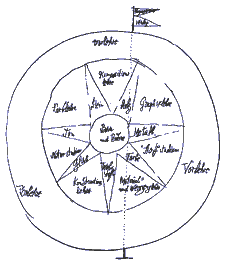
The inspiration came from the
artist Paul Klee, from whom we borrowed the wheel.
Click on his Principles for
the Bauhaus school from 1922 (above)
for enlargenment of the original sketch.
SASNET Contact
Journey Reports
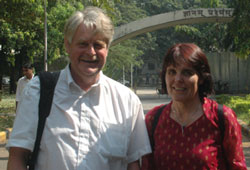 SASNET’s director Anna Lindberg and deputy director Lars Eklund travelled in Northern and Western/ Southwestern India during the period 1–30 November 2007.Totally, they visited more than 30 important universities and
research institutions, with an ambition to promote Indo-Swedish researcher cooperation
and student exchange in all fields, from medicine/natural sciences
to social sciences/humanities. A large number of fruitful meetings
were held in all the places visited, including Delhi, Thiruvananthapuram,
Kottayam, Kozhikode, Mumbai, Loni, Pune, Bangalore and Mysore.
In New Delhi, the Swedish Embassy also organised a reception/dinner
for the academic world in honour of the visiting SASNET delegation. Read
the short summary travel report, or read the more detailed travel report, with links to 34 special reports from each and every institution visited. SASNET’s director Anna Lindberg and deputy director Lars Eklund travelled in Northern and Western/ Southwestern India during the period 1–30 November 2007.Totally, they visited more than 30 important universities and
research institutions, with an ambition to promote Indo-Swedish researcher cooperation
and student exchange in all fields, from medicine/natural sciences
to social sciences/humanities. A large number of fruitful meetings
were held in all the places visited, including Delhi, Thiruvananthapuram,
Kottayam, Kozhikode, Mumbai, Loni, Pune, Bangalore and Mysore.
In New Delhi, the Swedish Embassy also organised a reception/dinner
for the academic world in honour of the visiting SASNET delegation. Read
the short summary travel report, or read the more detailed travel report, with links to 34 special reports from each and every institution visited. 
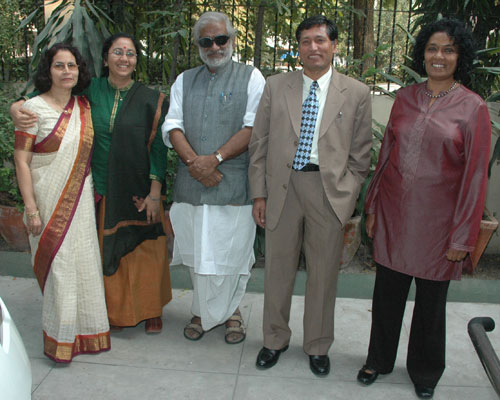 On Saturday 3 November 2007, a seminar meeting
was organised in New Delhi for SASNET’s South Asian Reference
group, consisting of a number of senior researchers from the
region,
who closely observe SASNET’s activities and give constructive
suggestions to the root node. On Saturday 3 November 2007, a seminar meeting
was organised in New Delhi for SASNET’s South Asian Reference
group, consisting of a number of senior researchers from the
region,
who closely observe SASNET’s activities and give constructive
suggestions to the root node.
SASNET’s
Director Anna Lindberg and the Deputy Director Lars Eklund
met and discussed with Dr. Rita Afsar, Bangladesh Institute
of Development Studies, Dhaka, Bangladesh; Dr.
Tek Nath Dhakal, Campus Chief of Public Administration Campus,
Tribhuvan University, Kathmandu, Nepal; Professor Kumudu Wijewardena,
University of Sri Jayewardenepura (SJP), Colombo, Sri Lanka;
Dr. Dipak Malik, Institute of Gandhian Studies,
Varanasi, India; and Dr. J. Devika, Centre for Development Studies (CDS), Thiruvananthapuram, Kerala, India. The only missing member was Professor Zulfiqar Bhutta,
Dept. of Paediatrics, Aga Khan University, Karachi, Pakistan. (More information about the group). The meeting was held at the Nordic Centre
in India (NCI) in Nizamuddin, New Delhi, and was organized informally as a “think tank” session. The atmosphere was conducive to an open and relaxed discussion, and the results were very fruitful. Read the report from the SASNET’s South Asian Reference Group meeting.
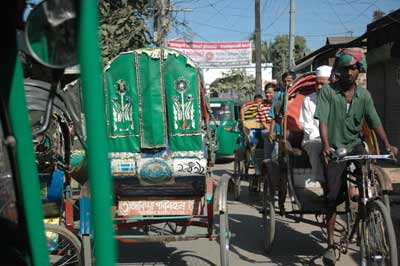 From 18 November
till 19 December 2005 SASNET’s director, Professor Staffan
Lindberg and the deputy director Lars Eklund travelled in the North-Eastern part of South Asia. They visited a great number of universities
and institutes in East and North-East
India (Kolkata, Bhubaneshwar, Patna, Siliguri, Guwahati and Shillong);
Bangladesh (Dhaka, Savar, Chittagong, Rajshahi and Sylhet); Bhutan
(Phuntsholing, Thimphu and Paro); and Nepal (Kathmandu). Go
for the extensive contact journey frame report. From 18 November
till 19 December 2005 SASNET’s director, Professor Staffan
Lindberg and the deputy director Lars Eklund travelled in the North-Eastern part of South Asia. They visited a great number of universities
and institutes in East and North-East
India (Kolkata, Bhubaneshwar, Patna, Siliguri, Guwahati and Shillong);
Bangladesh (Dhaka, Savar, Chittagong, Rajshahi and Sylhet); Bhutan
(Phuntsholing, Thimphu and Paro); and Nepal (Kathmandu). Go
for the extensive contact journey frame report.
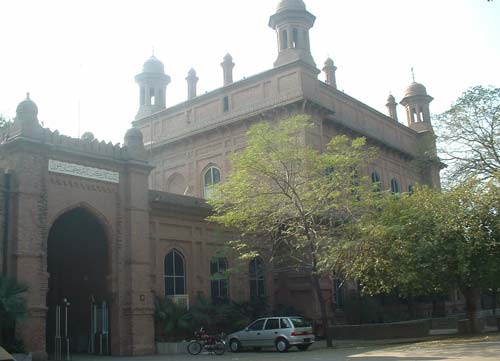 A SASNET contact journey to Pakistan and Afghanistan was made by SASNET’s director Staffan Lindberg, and webmaster/deputy
director Lars Eklund, 20 November – 7 December 2003. The aim
of the tour was to link up the SASNET activities with universities
and research institutions in the two countries. A SASNET contact journey to Pakistan and Afghanistan was made by SASNET’s director Staffan Lindberg, and webmaster/deputy
director Lars Eklund, 20 November – 7 December 2003. The aim
of the tour was to link up the SASNET activities with universities
and research institutions in the two countries.
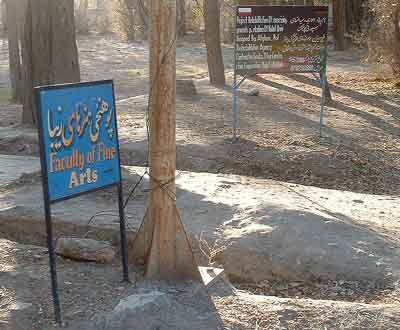 They visited Karachi, Islamabad, and Lahore in Pakistan; and Kabul
in Afghanistan. It turned out to be an extremely fruitful journey,
both building on the already existing academic links between a few
researchers/institutions in Sweden and Pakistan, and promoting new
forms of cooperation there as well as in Afghanistan. Read
the full reports on the journey. They visited Karachi, Islamabad, and Lahore in Pakistan; and Kabul
in Afghanistan. It turned out to be an extremely fruitful journey,
both building on the already existing academic links between a few
researchers/institutions in Sweden and Pakistan, and promoting new
forms of cooperation there as well as in Afghanistan. Read
the full reports on the journey.
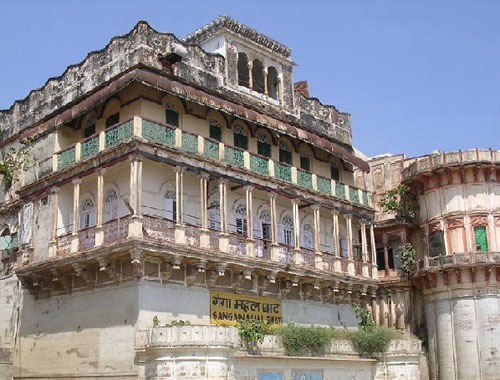 In the Spring 2002, Staffan Lindberg, and
Lars Eklund made a tour to South Asia in
order to link up the SASNET activities with universities and research
institutions in different countries of the region. The two visited
the Maldives (Male) 26–27 February, Sri Lanka 28 February–5
March, India (New Delhi, Varanasi, Hyderabad, Kolkata and Shantiniketan)
6–19 March; and finally Bangladesh 20–22 March. Read
their reports from the journey. In the Spring 2002, Staffan Lindberg, and
Lars Eklund made a tour to South Asia in
order to link up the SASNET activities with universities and research
institutions in different countries of the region. The two visited
the Maldives (Male) 26–27 February, Sri Lanka 28 February–5
March, India (New Delhi, Varanasi, Hyderabad, Kolkata and Shantiniketan)
6–19 March; and finally Bangladesh 20–22 March. Read
their reports from the journey.
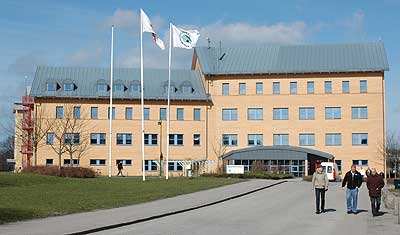 On
Wednesday 14 March 2007, SASNET’s
Director Staffan Lindberg and Deputy Director Lars Eklund visited the
School of Engineering at Blekinge Institute of Technology (BTH)
in Ronneby. They visited the campus
for a discussion of its activities related to South Asia and a
discussion of would SASNET could do for the promotion of its South
Asia activities. They were hosted by Jan-Olof
Gustavsson, Dean, School of Engineering, Maria
Engelmark, Head of International Office, Lars
Lundberg, Professor of Computer Systems Engineering, and Mikael Åsman,
Head of Masters Programme in Electrical Engineering. Read
a report from the SASNET visit to Ronneby. On
Wednesday 14 March 2007, SASNET’s
Director Staffan Lindberg and Deputy Director Lars Eklund visited the
School of Engineering at Blekinge Institute of Technology (BTH)
in Ronneby. They visited the campus
for a discussion of its activities related to South Asia and a
discussion of would SASNET could do for the promotion of its South
Asia activities. They were hosted by Jan-Olof
Gustavsson, Dean, School of Engineering, Maria
Engelmark, Head of International Office, Lars
Lundberg, Professor of Computer Systems Engineering, and Mikael Åsman,
Head of Masters Programme in Electrical Engineering. Read
a report from the SASNET visit to Ronneby. 
 On
Thursday 15 February 2007, SASNET’s Director Staffan Lindberg
and Deputy Director Lars Eklund visited Kalmar University and
met researchers involved in the SASNET network. Prof.
William Hogland at the Dept. of Technology (Ingenjörshögskolan)
presented plans for a new BSc/MSc/PhD programme in Environmental
Science and Engineering that is planned for in collaboration with
the Asian Institute of Technology in Thailand. Prof. Hans Jansson at
the Baltic Business School (BBS), a long time
specialist on Swedish business in India and China, presented the International
research carried out at BBS. Read
the SASNET report from Kalmar University. On
Thursday 15 February 2007, SASNET’s Director Staffan Lindberg
and Deputy Director Lars Eklund visited Kalmar University and
met researchers involved in the SASNET network. Prof.
William Hogland at the Dept. of Technology (Ingenjörshögskolan)
presented plans for a new BSc/MSc/PhD programme in Environmental
Science and Engineering that is planned for in collaboration with
the Asian Institute of Technology in Thailand. Prof. Hans Jansson at
the Baltic Business School (BBS), a long time
specialist on Swedish business in India and China, presented the International
research carried out at BBS. Read
the SASNET report from Kalmar University. 
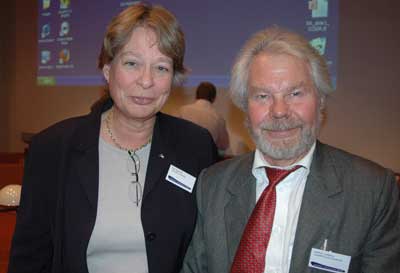 |
SASNET
successfully held a workshop on the "Role of South Asia
in the Internationa-lisation of Higher Education in Sweden" at
Nobel Forum, Karolinska Institutet in Stockholm 28-29 November
2006. It was jointly organised by SASNET, Karolinska
Institutet Medical University and the Swedish Institute, and
involved sessions with representatives from 20 Swedish universities,
and from the International Programme Office for Education and
Training; the Swedish National Agency for Higher Education; STINT;
the Government ministries of Education and Foreign Affairs; and
the South Asian embassies in Stockholm.
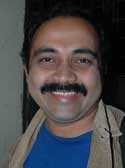 The
focus was on experiences from masters and PhD programmes in Sweden
as well as in South Asia, with an aim to promote increased academic
exchange with South Asia. The
focus was on experiences from masters and PhD programmes in Sweden
as well as in South Asia, with an aim to promote increased academic
exchange with South Asia.
Most of the workshop presentations are now available on our web site
as pdf-files. They include Mr. Sunandan Roy Chowdhury’s (photo
to the right) provocative keynote presentatIon, titled ”The
Moffusil and the Metropolitan – Higher
Education’s Meandering Paths”. In addition to this,
Jan Magnusson (a key person behind the creation of SASNET seven years
ago and now a member of SASNET’s board) has written a report,
summarizing the two-day workshop sessions. Read
the workshop report. 
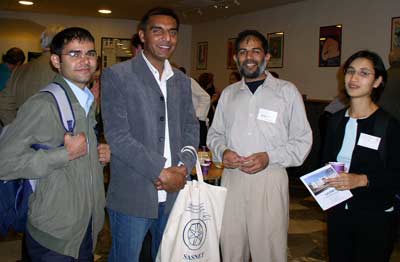 SASNET successfully arranged the 18th European Conference on Modern
South Asian Studies in Lund 6–9 July 2004. With 360
participants from all over the World actually turning up (including
a large number of PhD candidates and participants from from South
Asia itself) it was the largest ECMSAS conference so far, and certainly
the largest gathering ever on Swedish soil of South Asia oriented
researchers, covering all fields from the humanities and social
sciences to technology, natural sciences and medicine. Full
updated information on the Lund conference. SASNET successfully arranged the 18th European Conference on Modern
South Asian Studies in Lund 6–9 July 2004. With 360
participants from all over the World actually turning up (including
a large number of PhD candidates and participants from from South
Asia itself) it was the largest ECMSAS conference so far, and certainly
the largest gathering ever on Swedish soil of South Asia oriented
researchers, covering all fields from the humanities and social
sciences to technology, natural sciences and medicine. Full
updated information on the Lund conference.
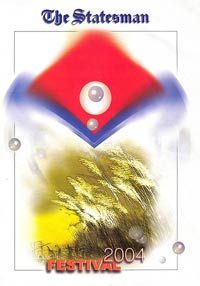 An extensive Conference Diary has been prepared by Dr. William Radice,
renowned Bengali Studies scholar from the School of Oriental
and African Studies, University of London, UK, and a brilliant writer.
He was assigned by the conference organisers to write it.
Read his report called ”Swedish Rhapsody”! (as a
pdf-file) An extensive Conference Diary has been prepared by Dr. William Radice,
renowned Bengali Studies scholar from the School of Oriental
and African Studies, University of London, UK, and a brilliant writer.
He was assigned by the conference organisers to write it.
Read his report called ”Swedish Rhapsody”! (as a
pdf-file)
Radice’s article has now also been published in extenso
in the 2004 Puja Festival publication from the The Statesman, Kolkata,
in October 2004. The article is illustrated with photos of Lund
University.
Behnoush Payvar’s photos from the five days of the
conference are now published on the web. Go
for the photo albums!
A large number of full papers presented to the
44 conference panels have been posted on the conference
website, and are still available. See the full
list of conference panels, abstracts and papers
The panel convenors have presented reports on the outcome
of their respective panel. Reports for 41 out of the 44
panels are available. Go for the summary
of Panel Reports (as a pdf-file)
SASNET’s webmaster Lars Eklund regularly visits
departments and researchers/educationists involved in South Asia
related research at Swedish universities.
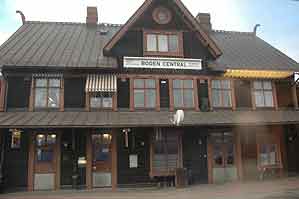 It is part of an effort to strenghten the SASNET national network.
In November 2004 he visited Örebro University in connection
with the 10th Anniversary celebration of the Sweden–India
Project, run by the Social Work programme; Department of Behavioural,
Social and Legal Sciences (report from the
occasion), but also visited the Department
of Caring Sciences. In December 2004 Lars went to Luleå
University of Technology, where he visited the Department of Economics and the Divisions of Industrial
Design, Mineral Processing, and Operation and Maintenance Engineering.
Earlier during 2004 Lars Eklund also visited the University of Dalarna,
Campus Falun, Göteborg University, and Linköping University
Campus Norrköping. It is part of an effort to strenghten the SASNET national network.
In November 2004 he visited Örebro University in connection
with the 10th Anniversary celebration of the Sweden–India
Project, run by the Social Work programme; Department of Behavioural,
Social and Legal Sciences (report from the
occasion), but also visited the Department
of Caring Sciences. In December 2004 Lars went to Luleå
University of Technology, where he visited the Department of Economics and the Divisions of Industrial
Design, Mineral Processing, and Operation and Maintenance Engineering.
Earlier during 2004 Lars Eklund also visited the University of Dalarna,
Campus Falun, Göteborg University, and Linköping University
Campus Norrköping.
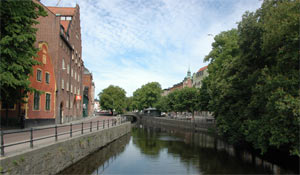 On
20 June 2005 Lars visited Uppsala University, where he met with
researchers at the Department of Linguistics and Philology (in the South Asian Languages and Culture division, the Iranian languages division,
and the Linguistics and Computer Lingustics division); at the Department of Cultural
Anthropology and Ethnology; and finally at the International
Maternal and Child Health (IMCH) division of the Dept. of Women's
and Children's Health. On
20 June 2005 Lars visited Uppsala University, where he met with
researchers at the Department of Linguistics and Philology (in the South Asian Languages and Culture division, the Iranian languages division,
and the Linguistics and Computer Lingustics division); at the Department of Cultural
Anthropology and Ethnology; and finally at the International
Maternal and Child Health (IMCH) division of the Dept. of Women's
and Children's Health.
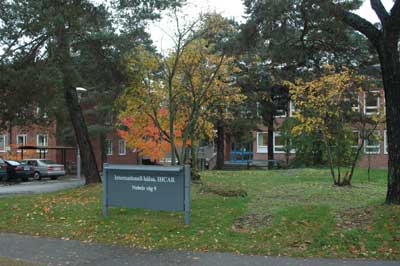 The
following day he proceeded to Karolinska Institutet Medical University
in Stockholm and met with researchers at the Division
of International Health (IHCAR), the Center
of Molecular Medicine; the Paediatric
Endocrinology Unit of the Dept. of Woman and Child Health, and
other departments involved in South Asia related research and education.
He also attended the meeting of Karolinska Institutet Research and
Training Committee, KIRT, when it decided to intensify and extend
the already existing collaboration on research and research training
with Pakistan (more information on KIRT). The
following day he proceeded to Karolinska Institutet Medical University
in Stockholm and met with researchers at the Division
of International Health (IHCAR), the Center
of Molecular Medicine; the Paediatric
Endocrinology Unit of the Dept. of Woman and Child Health, and
other departments involved in South Asia related research and education.
He also attended the meeting of Karolinska Institutet Research and
Training Committee, KIRT, when it decided to intensify and extend
the already existing collaboration on research and research training
with Pakistan (more information on KIRT).
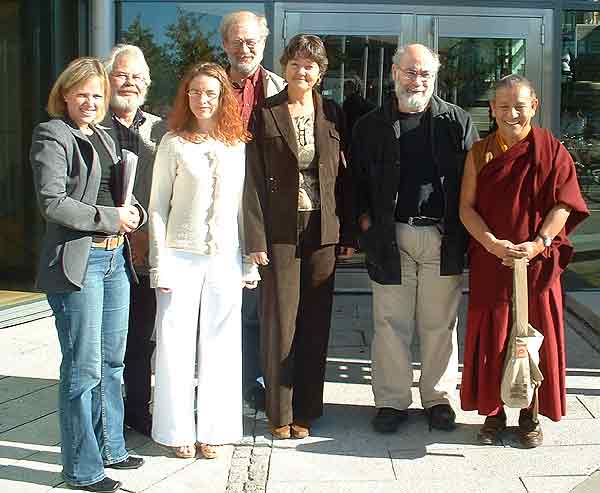 Follow-up meetings to the SASNET’s symposium in Marstrand
in October 2002 were arranged at Karlstad University and Göteborg
University in September 2003. Researchers, teachers and students
engaged in South Asian studies at Karlstad
University presented their work at a meeting on Wednesday
24 September (some of the participants shown on the photo to
the right). Read a report from the
Karlstad seminar. Follow-up meetings to the SASNET’s symposium in Marstrand
in October 2002 were arranged at Karlstad University and Göteborg
University in September 2003. Researchers, teachers and students
engaged in South Asian studies at Karlstad
University presented their work at a meeting on Wednesday
24 September (some of the participants shown on the photo to
the right). Read a report from the
Karlstad seminar.
Researchers, teachers and students engaged in South Asia related
research at Göteborg University
were given an introduction to SASNET and its web site at a meeting
on Thursday 25 September. More
information on the meeting in which SASNET’s Staffan Lindberg
and Lars Eklund took part.
As a follow-up on the discussions
that emerged at SASNET’s symposium for South Asia oriented
PhD students in Marstrand in October 2002 (read
the reports) Staffan Lindberg and Lars Eklund from SASNET visited
Stockholm and Uppsala 14–16 May 2003, and had local meetings
with researchers, teachers and students.
In Stockholm a meeting
was held at Karolinska Institutet Medical University on Wednesday
14 May 2003, with representatives from Stockholm University; Karolinska
Institutet; Royal Institute of Technology (KTH); and Södertörn
University College. Read a report from
the meeting.
In
Uppsala the Collegium for Development Studies held
a full-day seminar with PhD students, supervisors, and teachers/researchers,
with an introduction by Staffan Lindberg and Lars Eklund, on Friday
16 May, at Atrium Hotell and Conference.
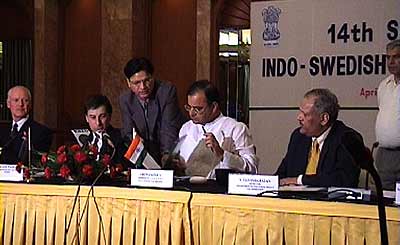 SASNET was represented in the Swedish delegation when the 14th session
of the joint Indo-Swedish commission met in New Delhi 1–2
April 2003. The delegations were led by Swedish minister of trade
and industry Mr Leif Pagrotsky, and Indian minister for commerce
and industry Mr Arun Jaitley. Although mainly focussing on issues
of trade and investment the session also included some matters pertaining
to science and technology.
SASNET was represented in the Swedish delegation when the 14th session
of the joint Indo-Swedish commission met in New Delhi 1–2
April 2003. The delegations were led by Swedish minister of trade
and industry Mr Leif Pagrotsky, and Indian minister for commerce
and industry Mr Arun Jaitley. Although mainly focussing on issues
of trade and investment the session also included some matters pertaining
to science and technology.
A paragraph stating SASNET's networking purpose and capacity to
act as an intermediary between the Swedish research community and
MHRD was added to the official minutes of the session.
Read Jan Magnusson’s report from the meeting.
The conference on Swedish Development Studies research,
named ”Fattiga och rika. Aktuell utvecklingsforskning och
dess villkor i Sverige” was organised by Sida/SAREC and
Lund University on 9–11 January 2003. The conditions for development
research in Sweden was thoroughly discussed, and a large number
of Swedish researchers presented their projects/programmes during
the extremely fruitful conference. Several of the projects are related
to South Asia. See SASNET’s list
of these, accompanied by abstracts.
We also present papers presented by two of the key speakers: •
Professor Barbara Harriss-White on ”Unruly
and Informal Globalisation and its Impact on Development: A Background
Note”, and • Professor Keith Griffin
on ”Economic Globalisation and Institutions
of Global Governance” (Word documents).
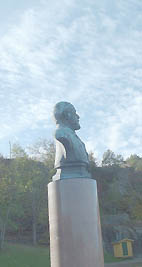 The SASNET symposium for Swedish PhD students and post-docs
engaged in research related to South Asia took place on 25–27
October 2002, at Marstrands Varmbadhus, north of Göteborg.
The sessions were devoted to discuss the situation of PhD students
in South Asian Studies or South Asia relevant studies (recruitment,
fieldwork, supervision, finishing, post-doc situation). Programme,
participants list and basis for discussions are available on our
web page http://www.sasnet.lu.se/phdsymp.html.
Reviews from the sessions and the group discussions are also published. The SASNET symposium for Swedish PhD students and post-docs
engaged in research related to South Asia took place on 25–27
October 2002, at Marstrands Varmbadhus, north of Göteborg.
The sessions were devoted to discuss the situation of PhD students
in South Asian Studies or South Asia relevant studies (recruitment,
fieldwork, supervision, finishing, post-doc situation). Programme,
participants list and basis for discussions are available on our
web page http://www.sasnet.lu.se/phdsymp.html.
Reviews from the sessions and the group discussions are also published.
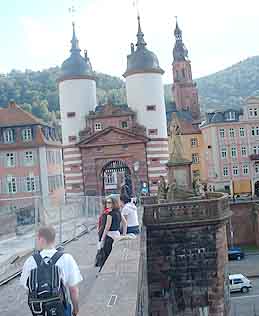 SASNET was represented by both Staffan Lindberg and Lars Eklund
at the 17th European Conference on Modern South Asian Studies,
which took place at Heidelberg, Germany, 9–14 September, 2002.
300 participating South Asia researchers from all over the World
made the conference into a major event. Read
our report on the conference. We also present a few snapshots
from the conference. See our images! SASNET was represented by both Staffan Lindberg and Lars Eklund
at the 17th European Conference on Modern South Asian Studies,
which took place at Heidelberg, Germany, 9–14 September, 2002.
300 participating South Asia researchers from all over the World
made the conference into a major event. Read
our report on the conference. We also present a few snapshots
from the conference. See our images!
SASNET International Workshop on global
networking at Lund 27–28 August 2001
The SASNET workshop about global networking in South Asian studies
took place in Lund on 27-28 August 2001. About 40 persons attended
the workshop and gave a good start for SASNET’s global networking.
Full report with all the papers read at
the workshop.
The final discussion round at the last day of SASNET’s workshop
on global networking in August, 2001, a discussion which summed
up the whole workshop, is transcribed and available on the SASNET
gateway. Go straight to it.
A workshop on ”Managing Common Resources
– What is the solution?” was orgaanised at Lund University
on 10–11 September 2001. SASNET’s Staffan Lindberg
was the key organiser of the symposium. Go
to the conference report including full research papers.
SASNET planning Conference in October 2000
On October 14-15, 2000 around 70 South Asia researchers in Sweden
came together at Grand Hotel in Lund to discuss the formation of
SASNET. Discussions were held on many topics. Reports
from the conference are to be found at SASNET´s old web
page.
Report from Karlstad.
Staffan Lindberg and Jan Magnusson visited Karlstad University,
December, 1, 2000.
Report
from Uppsala. Staffan Lindberg and Jan Magnusson visited
Uppsala University, December, 18, 2000.
Principles for the Third Task,
sugested by Jan Magnusson in November 2000, and agreed upon by the
SASNET board
Regional initiative in which SASNET is highly involved.
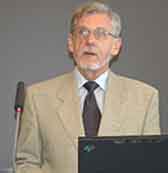 •
The ØRNAST educational cooperation project between the universities
of Lund and Copenhagen was formally inaugurated with a ceremony
at Copenhagen University on Tuesday 14 September 2004. •
The ØRNAST educational cooperation project between the universities
of Lund and Copenhagen was formally inaugurated with a ceremony
at Copenhagen University on Tuesday 14 September 2004.
More information on the ØRNAST cooperation.
Administrative
report no. 1 (Work report for the period August 1999 – 15
February 2001)
By Staffan Lindberg, acting
co-ordinator and chairman of the working group for SASNET; assisted
by Jan Magnusson, member of the working group and acting secretary/webmaster
until 31 December 2000 (Lund 16 February 2001).
Administrative
report no. 2 (Work report for the period 1 January 2001–
31 December 2001)
By Staffan Lindberg, director/co-ordinator;
and Lars Eklund, webmaster/deputy director
(Lund 10 January 2002).
Administrative
report no. 3 (Work report for the period 1 January 2002–
31 december 2002)
By Staffan Lindberg, director/co-ordinator;
and Lars Eklund, webmaster/deputy director (Lund 17 March
2003).
Administrative
report no. 4 (Work report for the period 1 January 2003–
31 december 2003)
By Staffan Lindberg, director/co-ordinator;
and Lars Eklund, webmaster/deputy director (Lund 16 March
2004).
Administrative
report no. 5 (Work report for the period 1 January 2004–
31 december 2004)
By Staffan Lindberg, director/co-ordinator;
and Lars Eklund, webmaster/deputy director (Lund 6 April 2005).
Administrative
report no. 6 (Work report for the period 1 January 2005–
31 december 2005)
By Staffan Lindberg, director/co-ordinator;
and Lars Eklund, webmaster/deputy director (Lund 7 April
2006).
Administrative
report no. 7 (Work report for the period 1 January 2006–
31 december 2006)
By Staffan Lindberg, director/co-ordinator;
and Lars Eklund, webmaster/deputy director (Lund 12 April 2007).
Administrative
report no. 8 (Work report for the period 1 January 2007–
31 december 2007)
By Anna Lindberg, director/co-ordinator;
and Lars Eklund, webmaster/deputy director (Lund 11 April 2008)
Administrative
report no. 9 (Work report for the period 1 January 2008–
31 december 2008)
By Anna Lindberg, director/co-ordinator;
and Lars Eklund, webmaster/deputy director (Lund 15 April 2009).
Published monthly. Join our mailing-list,
by sending us an e-mail,
to receive them regularly.
• Newsletter
1. January, 30, 2001
• Newsletter
2. February, 1, 2001
• Newsletter
3. March, 1, 2001
• Newsletter
4. April, 4, 2001
• Newsletter
5. May, 9, 2001
• Newsletter
6. June 12, 2001
• Newsletter
7. July, 18, 2001
• Newsletter
8. August, 22, 2001
• Newsletter
9. September 12, 2001
• Newsletter
10. October, 23, 2001
• Newsletter
11. December, 5, 2001
• Newsletter
12. January, 8, 2002
• Regional Newsletter, January,
28, 2002
• Newsletter
13. February, 14, 2002
• Regional
Newsletter, April, 5, 2002
• Newsletter
14. April, 8, 2002
• Regional
Newsletter, May, 7, 2003
• Newsletter
15. May, 13, 2002
• Newsletter
16. June, 11, 2002
• Newsletter
17. August, 9, 2002
• Newsletter
18. September, 6, 2002
• Newsletter
19. September, 26, 2002
• Newsletter
20. October, 24, 2002
• Newsletter
21. November, 15, 2002
• Newsletter
22. December, 19, 2003
• Newsletter
23. January 21, 2003
• Newsletter
24. February, 12, 2003
• Newsletter
25. March, 17, 2003
• Newsletter
26. April, 17, 2003
• Newsletter
27. May, 13, 2003
• Newsletter
28. June, 12, 2003
• Newsletter
29. July, 11, 2003
• Newsletter
30. August, 12, 2003
• Newsletter
31. September, 12, 2003
• Newsletter
32. October, 13, 2003
• Newsletter
33. November, 13, 2003
• Newsletter
34. December, 7, 2003
• Newsletter
35. January, 27, 2004
• Newsletter
36. February, 17, 2004
• Newsletter
37. March, 10, 2004
• Newsletter
38. April 15, 2004
• Newsletter
39. May, 11, 2004
• Newsletter
40. June, 15, 2004
• Newsletter
41. July, 15, 2004
• Newsletter
42. August, 27, 2004
• Newsletter
43. September, 17, 2004
• Newsletter
44. October, 5, 2004
• Newsletter
45. November, 3, 2004
• Newsletter
46. November, 25, 2004
• Newsletter
47. December, 23, 2004
• Tsunami
Newsletter. December, 30, 2004
• Newsletter
48. January, 20, 2005
• Newsletter
49. February, 18, 2005
• Newsletter
50. March, 18, 2005
• Newsletter
51. April, 19, 2005
• Newsletter
52. May, 19, 2005
• Newsletter
53. June, 30, 2005
• Newsletter
54. August, 15, 2005
• Newsletter
55. September, 23, 2005
• Newsletter
56. October, 20, 2005
• Newsletter
57. November, 17, 2005
• Newsletter
58. January, 23, 2006
• Newsletter
59. March, 9, 2006
• Newsletter 60. April, 7, 2006
• Newsletter 61. April, 28, 2006
• Newsletter 62. May, 24, 2006
• Newsletter 63. June, 20, 2006
• Newsletter 64. August, 25, 2006
• Newsletter 65. September, 20, 2006
• Newsletter 66. October, 17, 2006
• Newsletter 67. November, 9, 2006
• Newsletter 68. December, 11, 2006
• Newsletter 69. January, 9, 2007
• Newsletter 70. February, 9, 2007
• Newsletter 71. March, 6, 2007
• Newsletter 72. April, 17, 2006
• Newsletter 73. April, 27, 2007
• Newsletter 74. May, 29, 2007
• Newsletter
75. June, 20, 2007
• Newsletter 76. July, 13, 2007
• Newsletter 77. September, 14, 2007
• Newsletter 78. October, 9, 2007
• Newsletter 79. October, 20, 2007
• Newsletter 80. December, 14, 2007
• Newsletter 81. January, 30, 2008
• Newsletter 82. February, 27, 2008
• Newsletter 83. March, 27, 2008
• Newsletter 84. April, 25, 2008
• Newsletter 85. May, 20, 2008
• Newsletter 86. June, 10, 2008
• Newsletter 87. August, 21, 2008
• Newsletter 88. September, 15, 2008
• Newsletter 89. October, 3, 2008
• Newsletter 90. November, 3, 2008
• Newsletter 91. December, 5, 2008
• Newsletter 92. January, 14, 2009
• Newsletter 93. February, 4, 2009
• Newsletter 94. March, 10, 2009
• Newsletter 95. April 6, 2009
• Newsletter 96. April 30, 2009
• Newsletter 97. May, 27, 2009
• Newsletter 98. June, 11, 2009 
• 29 August, 2001. Minutes (pdf-file)
• 24 January, 2002. Minutes
(pdf-file)
• 27 August, 2002. Minutes
(pdf-file)
• 28 January, 2003. Minutes
(pdf-file)
• 26 August, 2003. Minutes
(pdf-file)
• 4 February 2004. Minutes
(pdf-file)
• 24 August 2004. Minutes
(pdf-file)
• 15 February
2005. Minutes (pdf-file)
• 30 August 2005. Minutes
(pdf-file)
• 14 February 2006. Minutes
(pdf-file)
• 29 August 2006. Minutes
(pdf-file)
• 29 January 2007. Minutes
(pdf-file)
• 28 August 2007. Minutes (pdf-file)
• 5 February 2008. Minutes
(pdf-file)
• 26 August 2008. Minutes
(pdf-file)
• 27 January 2009. Minutes
(pdf-file)
SASNET’s library of books and South Asia magazines

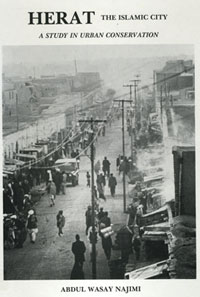 SASNET has a unique collection of books about South Asia in its root node office at Scheelevägen 15 D in Lund. The library consists of more than 120 doctoral dissertations from the middle of the 1990s (and in some cases even older) up to 2008 published in Sweden and the other Nordic countries; besides a large number of other titles. The unpretentious SASNET library encompasses a wide range of subjects, reflecting the variety of South Asia related research topics undertaken in the Nordic countries. SASNET has a unique collection of books about South Asia in its root node office at Scheelevägen 15 D in Lund. The library consists of more than 120 doctoral dissertations from the middle of the 1990s (and in some cases even older) up to 2008 published in Sweden and the other Nordic countries; besides a large number of other titles. The unpretentious SASNET library encompasses a wide range of subjects, reflecting the variety of South Asia related research topics undertaken in the Nordic countries.
We also keep a collection of mostly Sri Lanka related books donated to SASNET by the Swedish journalist Thomas Bibin. It includes books, pamphlets and articles (mostly from Sri Lankan authors) from the 1960s onwards.
Finally the library contains all the leading international peer-reviewed South Asia related journals within humanities and social sciences.
Books and journals can be borrowed from Lars Eklund, who manages the collection. SASNET also gladly accepts any new publications from recent PhDs, researchers and academics in the Nordic countries.
– Go for the catalogue of South Asia related theses in SASNET’s collection.
– Other books in the SASNET collection (pdf-file).
– The Thomas Bibin collection (pdf-file)
– Peer-reviewed journals (pdf-file)
 • SASNET has taken care of and catalogued a large books donation from the private library collection of the
renowned Swedish historian Karl Reinhold Haellquist, who passed
away in 2000 after working for many years at the Nordic Institute of Asian Studies
(NIAS) in Copenhagen. A large part of the collection, more than 6000 South Asia related
books, journals, videotapes and pamphlets on various aspects
of South Asian studies, was later donated to SASNET/Lund University by his wife, Inger Sondén-Haellquist. The collection includes Haellquist’s unique collection of books on Mahatma Gandhi. These Gandhi books, and other works from the collection, are now on display in Lund University’s Asia Library (adjacent to the SASNET root node office in Lund, open Monday-Friday 9–17, at Scheelevägen 15 C, first floor). The remaining part of Karl Reinhold Haellquist Memorial Collection is kept at SASNET’s office. More information on the Karl Reinhold Haellquist book donation. • SASNET has taken care of and catalogued a large books donation from the private library collection of the
renowned Swedish historian Karl Reinhold Haellquist, who passed
away in 2000 after working for many years at the Nordic Institute of Asian Studies
(NIAS) in Copenhagen. A large part of the collection, more than 6000 South Asia related
books, journals, videotapes and pamphlets on various aspects
of South Asian studies, was later donated to SASNET/Lund University by his wife, Inger Sondén-Haellquist. The collection includes Haellquist’s unique collection of books on Mahatma Gandhi. These Gandhi books, and other works from the collection, are now on display in Lund University’s Asia Library (adjacent to the SASNET root node office in Lund, open Monday-Friday 9–17, at Scheelevägen 15 C, first floor). The remaining part of Karl Reinhold Haellquist Memorial Collection is kept at SASNET’s office. More information on the Karl Reinhold Haellquist book donation.
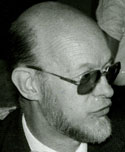 In 2007, the
Crafoord Foundation also decided to give a grant to
SASNET in order to digitalize other parts of Karl Reinhold Haellquist’s
(photo) private archive. With supplementary funding from SASNET this work was carried out during the Fall 2008 by a hired librarian, Erik Svanström. With regard to K R Haellquist’s specialised interest in Mahatma Gandhi, it was decided to concentrate the efforts to the vast material on Gandhi in Haellquist’s material.
In the new web site we meet Gandhi through Haellquist’s lecture notes. SASNET’s ambition is that it will continue to spread light on Gandhi and his ideas. GandhiServe Foundation has kindly given their permission to make digital use of the images in Haellquist's lecture notes. In 2007, the
Crafoord Foundation also decided to give a grant to
SASNET in order to digitalize other parts of Karl Reinhold Haellquist’s
(photo) private archive. With supplementary funding from SASNET this work was carried out during the Fall 2008 by a hired librarian, Erik Svanström. With regard to K R Haellquist’s specialised interest in Mahatma Gandhi, it was decided to concentrate the efforts to the vast material on Gandhi in Haellquist’s material.
In the new web site we meet Gandhi through Haellquist’s lecture notes. SASNET’s ambition is that it will continue to spread light on Gandhi and his ideas. GandhiServe Foundation has kindly given their permission to make digital use of the images in Haellquist's lecture notes.
Go for the KRHMC web site on Gandhi. 
|

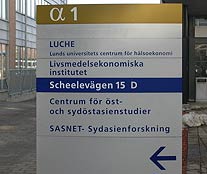

 In December 2008, SASNET’s deputy director Lars Eklund made a visit to Umeå University and the Swedish University of Agricultural Sciences in Umeå. Lars met with a large number of researchers, university teachers and administrators interested in South Asia related collaboration projects both in research and education, and the possibilities that SASNET might offer in facilitating such.
He visited departments where South Asia related research and/or education is going on, including the
In December 2008, SASNET’s deputy director Lars Eklund made a visit to Umeå University and the Swedish University of Agricultural Sciences in Umeå. Lars met with a large number of researchers, university teachers and administrators interested in South Asia related collaboration projects both in research and education, and the possibilities that SASNET might offer in facilitating such.
He visited departments where South Asia related research and/or education is going on, including the  For some time, Anna Lindberg will only work as Director on a 25 % basis. Therefore SASNET has recruited Dr.
For some time, Anna Lindberg will only work as Director on a 25 % basis. Therefore SASNET has recruited Dr. 
 Marie Yoshida, coordinator for the
Marie Yoshida, coordinator for the  Dr. Seteney Shami, Program Director for Eurasia, Middle East and North Africa at the Social Science Research Council (SSRC) in New York, USA, visited SASNET’s root node office in Lund on Monday 1 December 2008. During the academic year 2008/09, Dr. Shami is a research fellow at the
Dr. Seteney Shami, Program Director for Eurasia, Middle East and North Africa at the Social Science Research Council (SSRC) in New York, USA, visited SASNET’s root node office in Lund on Monday 1 December 2008. During the academic year 2008/09, Dr. Shami is a research fellow at the  SASNET was represented at the International conference on ”Peacebuilding in Afghanistan: Local, regional and global perspectives” that was held in Stockholm 6–7 November 2008. The conference focused on what the peacebuilding efforts look like in the country? What roles do the Afghan authorities, the International Community, the UN and the Nato-led ISAF forces play? Do they contribute to peace or armed conflict? Are there local initiatives at grassroots level promoting peace and how does the civilian population contribute to the reconstruction of the country? Why does Afghanistan receive so little funding for reconstruction compared to other areas of armed conflict? Have the complex developments in Afghanistan become something that the West would rather not have to deal with? What actions are needed in order for Afghanistan to become a country of peace and stability?
SASNET was represented at the International conference on ”Peacebuilding in Afghanistan: Local, regional and global perspectives” that was held in Stockholm 6–7 November 2008. The conference focused on what the peacebuilding efforts look like in the country? What roles do the Afghan authorities, the International Community, the UN and the Nato-led ISAF forces play? Do they contribute to peace or armed conflict? Are there local initiatives at grassroots level promoting peace and how does the civilian population contribute to the reconstruction of the country? Why does Afghanistan receive so little funding for reconstruction compared to other areas of armed conflict? Have the complex developments in Afghanistan become something that the West would rather not have to deal with? What actions are needed in order for Afghanistan to become a country of peace and stability? 
 A joint SASNET/UPF (Association of Foreign Affairs at Lund University) seminar on the political development in Nepal was held on Thursday 23 October 2008, 19.30–21.00. David Ludden (photo to the right), Professor of Political Economy and Globalization in the
A joint SASNET/UPF (Association of Foreign Affairs at Lund University) seminar on the political development in Nepal was held on Thursday 23 October 2008, 19.30–21.00. David Ludden (photo to the right), Professor of Political Economy and Globalization in the 


 The SASNET Student Forum has been launched. This interactive web forum provides a meeting point for research students interested in South Asia. Both experienced researchers and beginners are welcome to participate in the forum discussions, and the aim is to create a forum including both discussions on academic topics and on practical issues concerning travelling, studying and doing research in India. The forum primarily aims at MA and PhD students in South Asia related disciplines, but others are welcome to join the discussions as well. SASNET student forum is the first step towards creating a sub-network for MA and PhD students interested in South Asian studies. It has been created by PhD Candidate Malin Gregersen,
The SASNET Student Forum has been launched. This interactive web forum provides a meeting point for research students interested in South Asia. Both experienced researchers and beginners are welcome to participate in the forum discussions, and the aim is to create a forum including both discussions on academic topics and on practical issues concerning travelling, studying and doing research in India. The forum primarily aims at MA and PhD students in South Asia related disciplines, but others are welcome to join the discussions as well. SASNET student forum is the first step towards creating a sub-network for MA and PhD students interested in South Asian studies. It has been created by PhD Candidate Malin Gregersen, 
 • Mattias Larsen,
• Mattias Larsen, • Anna Laine,
• Anna Laine, • Daniel Andersson and Åke Sander,
• Daniel Andersson and Åke Sander, • Ferdinando Sardella,
• Ferdinando Sardella, On 25–26 September 2008, SASNET’s deputy director Lars Eklund visited Göteborg to visit the 2008 Göteborg Book Fair, an important event with several South Asian features. Seminars were held with Mahasweta Devi, Ambai and other invited Indian writers, that have got their works translated into Swedish through the ongoing Indo-Swedish translation project.
On 25–26 September 2008, SASNET’s deputy director Lars Eklund visited Göteborg to visit the 2008 Göteborg Book Fair, an important event with several South Asian features. Seminars were held with Mahasweta Devi, Ambai and other invited Indian writers, that have got their works translated into Swedish through the ongoing Indo-Swedish translation project.  Dr. Durre S. Ahmed, Head of Communication & Cultural Studies,
Dr. Durre S. Ahmed, Head of Communication & Cultural Studies,  Prof. Radhika Desai, Dept of Political Studies, University of Manitoba, Winnipeg, Canada, held a SASNET lecture on ”The Dynamics of Caste, Class and Hindu Nationalism in India” in Lund on Friday 19 September 2008. The seminar was organised in collaboration with the
Prof. Radhika Desai, Dept of Political Studies, University of Manitoba, Winnipeg, Canada, held a SASNET lecture on ”The Dynamics of Caste, Class and Hindu Nationalism in India” in Lund on Friday 19 September 2008. The seminar was organised in collaboration with the  Parul Sharma, CSR Advisor,
Group Assurance,
Sandvik AB, held a SASNET lecture at Lund University on Wednesday 10 September 2008, 13.15–15.00. The lecture was titled ”A Globalised South Asia and Human Rights”, and drew an audience of more than 40 people (mostly students from the Masters programme in Asian studies at Lund University’s
Parul Sharma, CSR Advisor,
Group Assurance,
Sandvik AB, held a SASNET lecture at Lund University on Wednesday 10 September 2008, 13.15–15.00. The lecture was titled ”A Globalised South Asia and Human Rights”, and drew an audience of more than 40 people (mostly students from the Masters programme in Asian studies at Lund University’s 

 During the Fall 2008, Maria Tonini worked on a voluntary basis as an assistant for SASNET. Ms. Tonini is an Italian citizen who has moved to Sweden. She completed a Masters degree in Critical Media and Cultural Studies from the the School of Oriental and African Studies (SOAS), University of London in 2006, and then worked as a Researcher and Online Editor for the
During the Fall 2008, Maria Tonini worked on a voluntary basis as an assistant for SASNET. Ms. Tonini is an Italian citizen who has moved to Sweden. She completed a Masters degree in Critical Media and Cultural Studies from the the School of Oriental and African Studies (SOAS), University of London in 2006, and then worked as a Researcher and Online Editor for the 
 SASNET’s Deputy Director Lars Eklund participated in the 20th European Conference on Modern South Asian Studies (ECMSAS)
that was held in Manchester, UK, 8–11 July 2008.
The 2008 conference
was hosted by the
SASNET’s Deputy Director Lars Eklund participated in the 20th European Conference on Modern South Asian Studies (ECMSAS)
that was held in Manchester, UK, 8–11 July 2008.
The 2008 conference
was hosted by the 
 On Tuesday 13 May 2008, Lars Eklund and Sidsel Hansson from SASNET again visited Göteborg University. In the morning they visited different medical departments at Sahlgrenska Academy involved in research collaboration with Pakistan, Bangladesh and Nepal. In the afternoon a meeting was organised at the School of Global Studies for several researchers working on South Asia related projects at different divisions within the School of Global Studies, as well as a few researchers coming from other departments in the Faculty of Humanities at Göteborg University.
On Tuesday 13 May 2008, Lars Eklund and Sidsel Hansson from SASNET again visited Göteborg University. In the morning they visited different medical departments at Sahlgrenska Academy involved in research collaboration with Pakistan, Bangladesh and Nepal. In the afternoon a meeting was organised at the School of Global Studies for several researchers working on South Asia related projects at different divisions within the School of Global Studies, as well as a few researchers coming from other departments in the Faculty of Humanities at Göteborg University.  Professor Venkatesh B. Athreya, MS Swaminathan Foundation, Chennai, India, held a well-attended SASNET/UPF lecture at Lund University on Monday 12 May 2008, 19.00–21.00. The lecture, jointly organised by SASNET and the Association of Foreign Affairs at Lund University (UPF), was titled ”Wealth and Poverty in
Rapidly Globalising India”. Currently, Prof. Athreya is co-operating with the Swedish sociologists Göran Djurfeldt and Staffan Lindberg, Dept. of Sociology, Lund University; and the two Indian researchers Dr. R. Vidyasagar from the Madras Institute of Development Studies in Chennai, India, and Dr. A. Rajagopal from SaciWATERs in Hyderabad, in a restudy of 300 agricultural households in Tiruchirapalli District, Tamil Nadu, people who were originally interviewed in 1979/80. The reason for coming to Lund was actually to participate in a concluding workshop regarding this project.
Professor Venkatesh B. Athreya, MS Swaminathan Foundation, Chennai, India, held a well-attended SASNET/UPF lecture at Lund University on Monday 12 May 2008, 19.00–21.00. The lecture, jointly organised by SASNET and the Association of Foreign Affairs at Lund University (UPF), was titled ”Wealth and Poverty in
Rapidly Globalising India”. Currently, Prof. Athreya is co-operating with the Swedish sociologists Göran Djurfeldt and Staffan Lindberg, Dept. of Sociology, Lund University; and the two Indian researchers Dr. R. Vidyasagar from the Madras Institute of Development Studies in Chennai, India, and Dr. A. Rajagopal from SaciWATERs in Hyderabad, in a restudy of 300 agricultural households in Tiruchirapalli District, Tamil Nadu, people who were originally interviewed in 1979/80. The reason for coming to Lund was actually to participate in a concluding workshop regarding this project.  SASNET’s acting director, Dr. Sidsel Hansson, and its deputy director, Lars Eklund, participated in the
SASNET’s acting director, Dr. Sidsel Hansson, and its deputy director, Lars Eklund, participated in the  The
Swedish International Development Cooperation Agency (Sida) was one of Globe Forum's partners this year. Sida's new Director-General Anders Nordström was one of the keynote speakers. Other invited speakers for the 2008 Globe Forum included Dipal Chandra Barua (photo to the right),
Deputy Managing Director for
Grameen Shakti (the
Nobel Prize Laureate microcredit institution); K.P. Nyati,
Principal Adviser, Confederation of Indian Industry (CII); and Bharti Patel from the
Society for Voluntary Action Revitalisation and Justice (SVARAJ) in Bangalore. Mr. Barua and Ms. Patel participated in a seminar on ”The rise of microfinance: How village women challenge Wall Street men”.
The
Swedish International Development Cooperation Agency (Sida) was one of Globe Forum's partners this year. Sida's new Director-General Anders Nordström was one of the keynote speakers. Other invited speakers for the 2008 Globe Forum included Dipal Chandra Barua (photo to the right),
Deputy Managing Director for
Grameen Shakti (the
Nobel Prize Laureate microcredit institution); K.P. Nyati,
Principal Adviser, Confederation of Indian Industry (CII); and Bharti Patel from the
Society for Voluntary Action Revitalisation and Justice (SVARAJ) in Bangalore. Mr. Barua and Ms. Patel participated in a seminar on ”The rise of microfinance: How village women challenge Wall Street men”.  On Friday 18 April 2008, Lars Eklund and Sidsel Hansson from SASNET visited Göteborg University and Chalmers University of Technology. In the morning they participated in a seminar titled ”Indien – ett framtidsland?” (India – land of the future?), organised by the Board of Regional Research in West Sweden (Reväst), at the
On Friday 18 April 2008, Lars Eklund and Sidsel Hansson from SASNET visited Göteborg University and Chalmers University of Technology. In the morning they participated in a seminar titled ”Indien – ett framtidsland?” (India – land of the future?), organised by the Board of Regional Research in West Sweden (Reväst), at the 
 On March 13, 2008, SASNET’s Director Anna Lindberg participated in a meeting at the Department for Asia and the Pacific region, Swedish Ministry of Foreign Affairs (UD) in Stockholm. The aim of the meeting was to discuss the new country strategy for development cooperation with India that has been announced by the Swedish Government. The task of implementing the new strategy has been given to the Swedish International Development Cooperation Agency (SIDA). “Traditional development cooperation” has been phased out and replaced by selective and actor-based development cooperation. The point of departure in the new strategy is that the financing of various projects will gradually shift to the partners involved.
On March 13, 2008, SASNET’s Director Anna Lindberg participated in a meeting at the Department for Asia and the Pacific region, Swedish Ministry of Foreign Affairs (UD) in Stockholm. The aim of the meeting was to discuss the new country strategy for development cooperation with India that has been announced by the Swedish Government. The task of implementing the new strategy has been given to the Swedish International Development Cooperation Agency (SIDA). “Traditional development cooperation” has been phased out and replaced by selective and actor-based development cooperation. The point of departure in the new strategy is that the financing of various projects will gradually shift to the partners involved.  • Dr. Anirudh Krishna, Associate Professor of Public Policy and Political Science at the Sanford Institute of Public Policy, Duke University, Durham, N.C., USA held a lecture in Lund on Tuesday 1 April 2008. The lecture, jointly organised by SASNET and the Association of Foreign Affairs at Lund University (UPF), was titled ”Active Social Capital: Tracing the Roots of Development and Democracy in India”, which is also the title of Dr. Krishna’s recently published book. During the academic year 2007/08, Dr. Krishna is on sabbatical leave from Duke University, instead being Olof Palme Visiting Professor at Uppsala University (
• Dr. Anirudh Krishna, Associate Professor of Public Policy and Political Science at the Sanford Institute of Public Policy, Duke University, Durham, N.C., USA held a lecture in Lund on Tuesday 1 April 2008. The lecture, jointly organised by SASNET and the Association of Foreign Affairs at Lund University (UPF), was titled ”Active Social Capital: Tracing the Roots of Development and Democracy in India”, which is also the title of Dr. Krishna’s recently published book. During the academic year 2007/08, Dr. Krishna is on sabbatical leave from Duke University, instead being Olof Palme Visiting Professor at Uppsala University ( Professor Asoke Bhattacharya from the Adult
and Continuing Education and Extension Centre at Jadavpur University in Kolkata, visited SASNET and Lund University 16–17 March 2008. During the early spring 2008, Prof. Bhattacharya spent three months as a visiting scholar at the Danish University for Pedagogy in Copenhagen. His research focuses on the work by the 19th Century Danish priest, poet and writer N F S Grundtvig, considered to be a pioneer within
the field of adult education, and while in Denmark Prof. Bhattacharya’s new book titled ”Education for
the People” was launched during a function at the Centre for Grundtvig Studies, University of Aarhus.
Professor Asoke Bhattacharya from the Adult
and Continuing Education and Extension Centre at Jadavpur University in Kolkata, visited SASNET and Lund University 16–17 March 2008. During the early spring 2008, Prof. Bhattacharya spent three months as a visiting scholar at the Danish University for Pedagogy in Copenhagen. His research focuses on the work by the 19th Century Danish priest, poet and writer N F S Grundtvig, considered to be a pioneer within
the field of adult education, and while in Denmark Prof. Bhattacharya’s new book titled ”Education for
the People” was launched during a function at the Centre for Grundtvig Studies, University of Aarhus.  Associate Professor Aida
Aragão-Lagergren,
Associate Professor Aida
Aragão-Lagergren, 
 On Wednesday 12 March 2008, SASNET’s deputy director Lars Eklund visited the Institute for Security and Development Policy (ISDP) in Nacka-Stockholm. A fruitful meeting was organised by ISDP’s deputy director Robert Nilsson, in order for Lars to present SASNET to the Director Niklas Swanström and other ISDP researchers currently working on projects related to South Asia and Afghanistan. ISDP was established as an independent research institute as late as October 2007 but has its roots in the Silk Road Studies Program that was launched at Uppsala University in 2002.
The Institute is dedicated to expanding understanding of international affairs, particularly the interrelationship between the issue areas of conflict, security and development, and has a core funding from the Swedish government/Ministry of Foreign Affairs. It has two constituent parts: the Central Asia-Caucasus Institute & Silk Road Studies Program ((CACI & SRSP) run in collaboration with the Johns Hopkins University’s School of Advanced International Studies in Washington D.C., USA; and the Asia Program oriented towards the Eastern part of the Eurasian continent including South Asia.
On Wednesday 12 March 2008, SASNET’s deputy director Lars Eklund visited the Institute for Security and Development Policy (ISDP) in Nacka-Stockholm. A fruitful meeting was organised by ISDP’s deputy director Robert Nilsson, in order for Lars to present SASNET to the Director Niklas Swanström and other ISDP researchers currently working on projects related to South Asia and Afghanistan. ISDP was established as an independent research institute as late as October 2007 but has its roots in the Silk Road Studies Program that was launched at Uppsala University in 2002.
The Institute is dedicated to expanding understanding of international affairs, particularly the interrelationship between the issue areas of conflict, security and development, and has a core funding from the Swedish government/Ministry of Foreign Affairs. It has two constituent parts: the Central Asia-Caucasus Institute & Silk Road Studies Program ((CACI & SRSP) run in collaboration with the Johns Hopkins University’s School of Advanced International Studies in Washington D.C., USA; and the Asia Program oriented towards the Eastern part of the Eurasian continent including South Asia.  Dr. Soumyajit Samantha from North Bengal University in Siliguri, India, held a SASNET lecture in Lund on Monday 10 March 2008. He lectured on ”From Salman Rushdie to Arundhati Roy – Modern Indian Novels as Analysis of
Changing India and as World Literature”. The seminar was organised in collaboration with the Association of Foreign Affairs (UPF) and the Dept. of Comparative Literature, Lund University. Dr. Samantha was invited to Sweden with the help of a SASNET guest lecture tour grant, to hold lectures at Lund University and Växjö University. During his stay in Lund, he was accommodated by Prof. Staffan Lindberg, SASNET’s former Director.
Dr. Soumyajit Samantha from North Bengal University in Siliguri, India, held a SASNET lecture in Lund on Monday 10 March 2008. He lectured on ”From Salman Rushdie to Arundhati Roy – Modern Indian Novels as Analysis of
Changing India and as World Literature”. The seminar was organised in collaboration with the Association of Foreign Affairs (UPF) and the Dept. of Comparative Literature, Lund University. Dr. Samantha was invited to Sweden with the help of a SASNET guest lecture tour grant, to hold lectures at Lund University and Växjö University. During his stay in Lund, he was accommodated by Prof. Staffan Lindberg, SASNET’s former Director. 

 The documentary film ”Killing Time”, focusing on the Bhutanese refugees now living in camps in Nepal, was shown at an open SASNET seminar in Lund on Wednesday 6 February 2008, 15.00–17.00. The film is made by the Swedish-Canadian Director Annika Gustafson, and follows the people who were forced to leave Bhutan after the the Buddhist King of Bhutan in the late 1980s implemented strict cultural laws directly affecting the life and religious freedom of the Hindu population in the south. It includes interviews with Nisha Varia, Asia Specialist, Human Rights Watch, New York; Eve Lester, Refugee Coordinator, Amnesty International, London; Abraham Abraham, Country Director, UNHCR, Nepal; Donna Galwa, Security Officer, UNHCR, Nepal; and Daw Penjo, Bhutanese Ambassador to the UN, New York. The screening of the film, organised in collaboration with the
The documentary film ”Killing Time”, focusing on the Bhutanese refugees now living in camps in Nepal, was shown at an open SASNET seminar in Lund on Wednesday 6 February 2008, 15.00–17.00. The film is made by the Swedish-Canadian Director Annika Gustafson, and follows the people who were forced to leave Bhutan after the the Buddhist King of Bhutan in the late 1980s implemented strict cultural laws directly affecting the life and religious freedom of the Hindu population in the south. It includes interviews with Nisha Varia, Asia Specialist, Human Rights Watch, New York; Eve Lester, Refugee Coordinator, Amnesty International, London; Abraham Abraham, Country Director, UNHCR, Nepal; Donna Galwa, Security Officer, UNHCR, Nepal; and Daw Penjo, Bhutanese Ambassador to the UN, New York. The screening of the film, organised in collaboration with the  Through its involvement with the
Through its involvement with the 
 Mr. Sunandan Roy Chowdhury, Editor-Publisher of the Sampark Journal of Global Understanding in Kolkata, India, gave a SASNET lecture on ”Ideology of Nation State and Educational Policy”, focusing on Indian Higher education since 1947, at Lund University on Tuesday 23 October 2007, 15.15–17.00. Mr. Roy Chowdhury, who is also a researcher in didactics and participated as a key speaker at SASNET’s workshop on ”The Role of South Asia in
the Internationalisation of
Higher Education in Sweden” (held at Karolinska Institutet in Stockholm, November 2006,
Mr. Sunandan Roy Chowdhury, Editor-Publisher of the Sampark Journal of Global Understanding in Kolkata, India, gave a SASNET lecture on ”Ideology of Nation State and Educational Policy”, focusing on Indian Higher education since 1947, at Lund University on Tuesday 23 October 2007, 15.15–17.00. Mr. Roy Chowdhury, who is also a researcher in didactics and participated as a key speaker at SASNET’s workshop on ”The Role of South Asia in
the Internationalisation of
Higher Education in Sweden” (held at Karolinska Institutet in Stockholm, November 2006, 
 Professor Priyankar Upadyaya, Director at the Malaviya Centre for Peace Research at Banaras Hindu University, Varanasi, India, held a SASNET lecture at Lund University on Tuesday 25 September 2007, 13.15–15.00, about ”Naxal Violence in India.
Security Threat or Failure of Governance?”. The lecture was organised in collaboration with Lund University’s
Professor Priyankar Upadyaya, Director at the Malaviya Centre for Peace Research at Banaras Hindu University, Varanasi, India, held a SASNET lecture at Lund University on Tuesday 25 September 2007, 13.15–15.00, about ”Naxal Violence in India.
Security Threat or Failure of Governance?”. The lecture was organised in collaboration with Lund University’s 
 From Kungsholmen, Anna and Lars went to make a short visit to the ongoing
From Kungsholmen, Anna and Lars went to make a short visit to the ongoing  Dr.
Stefan Jonsson from the Swedish Institute for Growth Policy
Studies (ITPS) visited SASNET’s root node office in Lund on Tuesday
19 June 2007. From the middle of August 2007,
Stefan Jonsson (photo
to the right), will be based at the
Swedish Embassy in New Delhi, working as Counsellor
for Science and Technology. He has a background in Economics
from the
Dr.
Stefan Jonsson from the Swedish Institute for Growth Policy
Studies (ITPS) visited SASNET’s root node office in Lund on Tuesday
19 June 2007. From the middle of August 2007,
Stefan Jonsson (photo
to the right), will be based at the
Swedish Embassy in New Delhi, working as Counsellor
for Science and Technology. He has a background in Economics
from the  On
Wednesday 23 May 2007, the Sweden-India Business Council (SIBC)
organised a successful afternoon seminar in Lund titled ”The
New India” (Det nya Indien) in collaboration with SASNET
and Ideon Science Park. It attracted around 50 people
from companies in South Sweden and from Lund University. SASNET’s
Director, Prof. Staffan Lindberg, was the moderator for the day,
and he also lectured about ”Vad är nytt med Indien – förändringar
de senaste 25 åren”. Other participants included
Susanna Bill, Innovations Manager at Sony Ericsson Mobile Communications
AB in Lund. She talked about
”How to Unleash the Power of Emerging Markets”,
based on Sony Ericsson’s experiences. Anne-Charlotte Sukhia
from ACS Interkulturell Utbildning discussed cultural differences
in business life, and Ingemar Ljungdahl from CTO Telelogic AB presented
the development of Telelogic AB in the Indian market.
On
Wednesday 23 May 2007, the Sweden-India Business Council (SIBC)
organised a successful afternoon seminar in Lund titled ”The
New India” (Det nya Indien) in collaboration with SASNET
and Ideon Science Park. It attracted around 50 people
from companies in South Sweden and from Lund University. SASNET’s
Director, Prof. Staffan Lindberg, was the moderator for the day,
and he also lectured about ”Vad är nytt med Indien – förändringar
de senaste 25 åren”. Other participants included
Susanna Bill, Innovations Manager at Sony Ericsson Mobile Communications
AB in Lund. She talked about
”How to Unleash the Power of Emerging Markets”,
based on Sony Ericsson’s experiences. Anne-Charlotte Sukhia
from ACS Interkulturell Utbildning discussed cultural differences
in business life, and Ingemar Ljungdahl from CTO Telelogic AB presented
the development of Telelogic AB in the Indian market.  Mr.
Rajesh Vaishnaw (photo to the right), First Secretary (Press,
Information, Culture) at the Embassy of India in Stockholm visited
Lund University 9–11
May 2007.
The programme was prepared by SASNET and included visits
to the
Mr.
Rajesh Vaishnaw (photo to the right), First Secretary (Press,
Information, Culture) at the Embassy of India in Stockholm visited
Lund University 9–11
May 2007.
The programme was prepared by SASNET and included visits
to the 




 Lars
Eklund from SASNET was invited to attend a book release function
as honorary guest at Swosti Hotel in Bhubaneshwar, India, on 16
December 2005. The book, ”Paralysed
Tongue. An anthology of Dalit studies” (Pagemaker, Bhubaneshwar,
2005) incorporates several papers presented in a panel on Dalit
Literature at the 18th European Conference on Modern South Asian
Studies, organised by SASNET in Lund in June 2004. The book has
been edited by Aswini Kumar Mishra and Jugal K Mishra, and
deals with Dalit literature not only in different parts of India,
but also covers the other South Asian countries, including Nepal,
Bangladesh, Pakistan and Afghanistan.
Lars
Eklund from SASNET was invited to attend a book release function
as honorary guest at Swosti Hotel in Bhubaneshwar, India, on 16
December 2005. The book, ”Paralysed
Tongue. An anthology of Dalit studies” (Pagemaker, Bhubaneshwar,
2005) incorporates several papers presented in a panel on Dalit
Literature at the 18th European Conference on Modern South Asian
Studies, organised by SASNET in Lund in June 2004. The book has
been edited by Aswini Kumar Mishra and Jugal K Mishra, and
deals with Dalit literature not only in different parts of India,
but also covers the other South Asian countries, including Nepal,
Bangladesh, Pakistan and Afghanistan.  The three external evaluators who have have scrutinized the activities
of SASNET presented their final report to Sida/SAREC and Lund
University on Thursday 30 June 2005. During the second
week of May 2005 a team of three evaluators have visited the
SASNET root node at Lund; Sida/SAREC and the Foreign Ministry
in Stockholm, and SASNET partners at the universities of Stockholm,
Uppsala, Karlstad, Göteborg
and Lund. The evaluation group consisted of Prof. Ghanshyam
Shah, Political Scientist from Ahmedabad, India; Prof. Carla
Risseeuw, Dept. of Anthropology and Development Sociology,
University of Leiden, The Netherlands; and Mr. Lennart
Wohlgemut, Director of the Nordic Africa Institute
in Uppsala (team leader). The report was to become the basis for
SASNET’s
application for renewed funding from Sida/SAREC and Lund University
for the period 2006–2008. The evaluation group on the
photo above.
The three external evaluators who have have scrutinized the activities
of SASNET presented their final report to Sida/SAREC and Lund
University on Thursday 30 June 2005. During the second
week of May 2005 a team of three evaluators have visited the
SASNET root node at Lund; Sida/SAREC and the Foreign Ministry
in Stockholm, and SASNET partners at the universities of Stockholm,
Uppsala, Karlstad, Göteborg
and Lund. The evaluation group consisted of Prof. Ghanshyam
Shah, Political Scientist from Ahmedabad, India; Prof. Carla
Risseeuw, Dept. of Anthropology and Development Sociology,
University of Leiden, The Netherlands; and Mr. Lennart
Wohlgemut, Director of the Nordic Africa Institute
in Uppsala (team leader). The report was to become the basis for
SASNET’s
application for renewed funding from Sida/SAREC and Lund University
for the period 2006–2008. The evaluation group on the
photo above.  The Indian Ambassador to Sweden, Ms. Deepa Gopalan Wadhwa, along
with the First Secretary of the Embassy, Ms. Vani Rao, visited Lund
University on Monday 13 June 2005. The programme for the day,
prepared by SASNET, included visits to the Dept. of Biotechnology,
and the Section for Indic Religions at the Centre for Theology and
Religious Studies, where meetings were held with a large number
of South Asia related reserachers at Lund University. The Ambassador
also had meetings with the Vice-Chancellor Prof. Göran Bexell,
and with the SASNET root node staff.
The Indian Ambassador to Sweden, Ms. Deepa Gopalan Wadhwa, along
with the First Secretary of the Embassy, Ms. Vani Rao, visited Lund
University on Monday 13 June 2005. The programme for the day,
prepared by SASNET, included visits to the Dept. of Biotechnology,
and the Section for Indic Religions at the Centre for Theology and
Religious Studies, where meetings were held with a large number
of South Asia related reserachers at Lund University. The Ambassador
also had meetings with the Vice-Chancellor Prof. Göran Bexell,
and with the SASNET root node staff. 

 SASNET’s director Anna Lindberg and deputy director Lars Eklund travelled in Northern and Western/ Southwestern India during the period 1–30 November 2007.Totally, they visited more than 30 important universities and
research institutions, with an ambition to promote Indo-Swedish researcher cooperation
and student exchange in all fields, from medicine/natural sciences
to social sciences/humanities. A large number of fruitful meetings
were held in all the places visited, including Delhi, Thiruvananthapuram,
Kottayam, Kozhikode, Mumbai, Loni, Pune, Bangalore and Mysore.
In New Delhi, the Swedish Embassy also organised a reception/dinner
for the academic world in honour of the visiting SASNET delegation.
SASNET’s director Anna Lindberg and deputy director Lars Eklund travelled in Northern and Western/ Southwestern India during the period 1–30 November 2007.Totally, they visited more than 30 important universities and
research institutions, with an ambition to promote Indo-Swedish researcher cooperation
and student exchange in all fields, from medicine/natural sciences
to social sciences/humanities. A large number of fruitful meetings
were held in all the places visited, including Delhi, Thiruvananthapuram,
Kottayam, Kozhikode, Mumbai, Loni, Pune, Bangalore and Mysore.
In New Delhi, the Swedish Embassy also organised a reception/dinner
for the academic world in honour of the visiting SASNET delegation. 
 From 18 November
till 19 December 2005 SASNET’s director, Professor Staffan
Lindberg and the deputy director Lars Eklund travelled in the North-Eastern part of South Asia. They visited a great number of universities
and institutes in East and North-East
India (Kolkata, Bhubaneshwar, Patna, Siliguri, Guwahati and Shillong);
Bangladesh (Dhaka, Savar, Chittagong, Rajshahi and Sylhet); Bhutan
(Phuntsholing, Thimphu and Paro); and Nepal (Kathmandu).
From 18 November
till 19 December 2005 SASNET’s director, Professor Staffan
Lindberg and the deputy director Lars Eklund travelled in the North-Eastern part of South Asia. They visited a great number of universities
and institutes in East and North-East
India (Kolkata, Bhubaneshwar, Patna, Siliguri, Guwahati and Shillong);
Bangladesh (Dhaka, Savar, Chittagong, Rajshahi and Sylhet); Bhutan
(Phuntsholing, Thimphu and Paro); and Nepal (Kathmandu).  A SASNET contact journey to Pakistan and Afghanistan was made by SASNET’s director Staffan Lindberg, and webmaster/deputy
director Lars Eklund, 20 November – 7 December 2003. The aim
of the tour was to link up the SASNET activities with universities
and research institutions in the two countries.
A SASNET contact journey to Pakistan and Afghanistan was made by SASNET’s director Staffan Lindberg, and webmaster/deputy
director Lars Eklund, 20 November – 7 December 2003. The aim
of the tour was to link up the SASNET activities with universities
and research institutions in the two countries. They visited Karachi, Islamabad, and Lahore in Pakistan; and Kabul
in Afghanistan. It turned out to be an extremely fruitful journey,
both building on the already existing academic links between a few
researchers/institutions in Sweden and Pakistan, and promoting new
forms of cooperation there as well as in Afghanistan.
They visited Karachi, Islamabad, and Lahore in Pakistan; and Kabul
in Afghanistan. It turned out to be an extremely fruitful journey,
both building on the already existing academic links between a few
researchers/institutions in Sweden and Pakistan, and promoting new
forms of cooperation there as well as in Afghanistan.  In the Spring 2002, Staffan Lindberg, and
Lars Eklund made a tour to South Asia in
order to link up the SASNET activities with universities and research
institutions in different countries of the region. The two visited
the Maldives (Male) 26–27 February, Sri Lanka 28 February–5
March, India (New Delhi, Varanasi, Hyderabad, Kolkata and Shantiniketan)
6–19 March; and finally Bangladesh 20–22 March.
In the Spring 2002, Staffan Lindberg, and
Lars Eklund made a tour to South Asia in
order to link up the SASNET activities with universities and research
institutions in different countries of the region. The two visited
the Maldives (Male) 26–27 February, Sri Lanka 28 February–5
March, India (New Delhi, Varanasi, Hyderabad, Kolkata and Shantiniketan)
6–19 March; and finally Bangladesh 20–22 March.  On
Wednesday 14 March 2007, SASNET’s
Director Staffan Lindberg and Deputy Director Lars Eklund visited the
School of Engineering at Blekinge Institute of Technology (BTH)
in Ronneby. They visited the campus
for a discussion of its activities related to South Asia and a
discussion of would SASNET could do for the promotion of its South
Asia activities. They were hosted by Jan-Olof
Gustavsson, Dean, School of Engineering, Maria
Engelmark, Head of International Office, Lars
Lundberg, Professor of Computer Systems Engineering, and Mikael Åsman,
Head of Masters Programme in Electrical Engineering.
On
Wednesday 14 March 2007, SASNET’s
Director Staffan Lindberg and Deputy Director Lars Eklund visited the
School of Engineering at Blekinge Institute of Technology (BTH)
in Ronneby. They visited the campus
for a discussion of its activities related to South Asia and a
discussion of would SASNET could do for the promotion of its South
Asia activities. They were hosted by Jan-Olof
Gustavsson, Dean, School of Engineering, Maria
Engelmark, Head of International Office, Lars
Lundberg, Professor of Computer Systems Engineering, and Mikael Åsman,
Head of Masters Programme in Electrical Engineering.  On
Thursday 15 February 2007, SASNET’s Director Staffan Lindberg
and Deputy Director Lars Eklund visited Kalmar University and
met researchers involved in the SASNET network. Prof.
William Hogland at the
On
Thursday 15 February 2007, SASNET’s Director Staffan Lindberg
and Deputy Director Lars Eklund visited Kalmar University and
met researchers involved in the SASNET network. Prof.
William Hogland at the 
 The
focus was on experiences from masters and PhD programmes in Sweden
as well as in South Asia, with an aim to promote increased academic
exchange with South Asia.
The
focus was on experiences from masters and PhD programmes in Sweden
as well as in South Asia, with an aim to promote increased academic
exchange with South Asia. 
 An extensive Conference Diary has been prepared by Dr. William Radice,
renowned Bengali Studies scholar from the School of Oriental
and African Studies, University of London, UK, and a brilliant writer.
He was assigned by the conference organisers to write it.
An extensive Conference Diary has been prepared by Dr. William Radice,
renowned Bengali Studies scholar from the School of Oriental
and African Studies, University of London, UK, and a brilliant writer.
He was assigned by the conference organisers to write it.  It is part of an effort to strenghten the SASNET national network.
In November 2004 he visited Örebro University in connection
with the 10th Anniversary celebration of the Sweden–India
Project, run by the Social Work programme; Department of Behavioural,
Social and Legal Sciences (
It is part of an effort to strenghten the SASNET national network.
In November 2004 he visited Örebro University in connection
with the 10th Anniversary celebration of the Sweden–India
Project, run by the Social Work programme; Department of Behavioural,
Social and Legal Sciences ( On
20 June 2005 Lars visited Uppsala University, where he met with
researchers at the Department of Linguistics and Philology (in the
On
20 June 2005 Lars visited Uppsala University, where he met with
researchers at the Department of Linguistics and Philology (in the  The
following day he proceeded to Karolinska Institutet Medical University
in Stockholm and met with researchers at the
The
following day he proceeded to Karolinska Institutet Medical University
in Stockholm and met with researchers at the  Follow-up meetings to the SASNET’s symposium in Marstrand
in October 2002 were arranged at Karlstad University and Göteborg
University in September 2003. Researchers, teachers and students
engaged in South Asian studies at Karlstad
University presented their work at a meeting on Wednesday
24 September (some of the participants shown on the photo to
the right).
Follow-up meetings to the SASNET’s symposium in Marstrand
in October 2002 were arranged at Karlstad University and Göteborg
University in September 2003. Researchers, teachers and students
engaged in South Asian studies at Karlstad
University presented their work at a meeting on Wednesday
24 September (some of the participants shown on the photo to
the right). 
 The SASNET symposium for Swedish PhD students and post-docs
engaged in research related to South Asia took place on 25–27
October 2002, at Marstrands Varmbadhus, north of Göteborg.
The sessions were devoted to discuss the situation of PhD students
in South Asian Studies or South Asia relevant studies (recruitment,
fieldwork, supervision, finishing, post-doc situation). Programme,
participants list and basis for discussions are available on our
web page
The SASNET symposium for Swedish PhD students and post-docs
engaged in research related to South Asia took place on 25–27
October 2002, at Marstrands Varmbadhus, north of Göteborg.
The sessions were devoted to discuss the situation of PhD students
in South Asian Studies or South Asia relevant studies (recruitment,
fieldwork, supervision, finishing, post-doc situation). Programme,
participants list and basis for discussions are available on our
web page  SASNET was represented by both Staffan Lindberg and Lars Eklund
at the 17th European Conference on Modern South Asian Studies,
which took place at Heidelberg, Germany, 9–14 September, 2002.
300 participating South Asia researchers from all over the World
made the conference into a major event.
SASNET was represented by both Staffan Lindberg and Lars Eklund
at the 17th European Conference on Modern South Asian Studies,
which took place at Heidelberg, Germany, 9–14 September, 2002.
300 participating South Asia researchers from all over the World
made the conference into a major event.  •
The ØRNAST educational cooperation project between the universities
of Lund and Copenhagen was formally inaugurated with a ceremony
at Copenhagen University on Tuesday 14 September 2004.
•
The ØRNAST educational cooperation project between the universities
of Lund and Copenhagen was formally inaugurated with a ceremony
at Copenhagen University on Tuesday 14 September 2004. SASNET has a unique collection of books about South Asia in its root node office at Scheelevägen 15 D in Lund. The library consists of more than 120 doctoral dissertations from the middle of the 1990s (and in some cases even older) up to 2008 published in Sweden and the other Nordic countries; besides a large number of other titles. The unpretentious SASNET library encompasses a wide range of subjects, reflecting the variety of South Asia related research topics undertaken in the Nordic countries.
SASNET has a unique collection of books about South Asia in its root node office at Scheelevägen 15 D in Lund. The library consists of more than 120 doctoral dissertations from the middle of the 1990s (and in some cases even older) up to 2008 published in Sweden and the other Nordic countries; besides a large number of other titles. The unpretentious SASNET library encompasses a wide range of subjects, reflecting the variety of South Asia related research topics undertaken in the Nordic countries.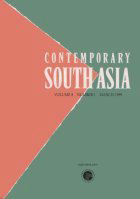

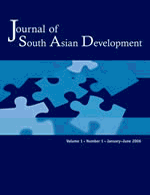


 In 2007, the
Crafoord Foundation also decided to give a grant to
SASNET in order to digitalize other parts of Karl Reinhold Haellquist’s
(photo) private archive. With supplementary funding from SASNET this work was carried out during the Fall 2008 by a hired librarian, Erik Svanström. With regard to K R Haellquist’s specialised interest in Mahatma Gandhi, it was decided to concentrate the efforts to the vast material on Gandhi in Haellquist’s material.
In the new web site we meet Gandhi through Haellquist’s lecture notes. SASNET’s ambition is that it will continue to spread light on Gandhi and his ideas.
In 2007, the
Crafoord Foundation also decided to give a grant to
SASNET in order to digitalize other parts of Karl Reinhold Haellquist’s
(photo) private archive. With supplementary funding from SASNET this work was carried out during the Fall 2008 by a hired librarian, Erik Svanström. With regard to K R Haellquist’s specialised interest in Mahatma Gandhi, it was decided to concentrate the efforts to the vast material on Gandhi in Haellquist’s material.
In the new web site we meet Gandhi through Haellquist’s lecture notes. SASNET’s ambition is that it will continue to spread light on Gandhi and his ideas.